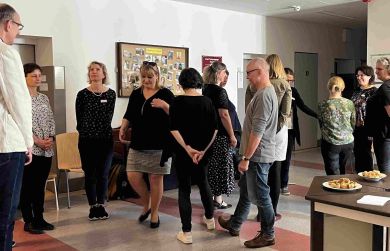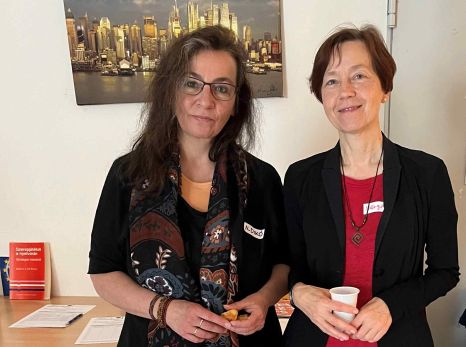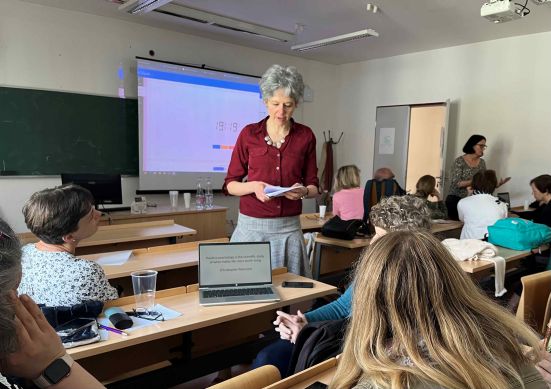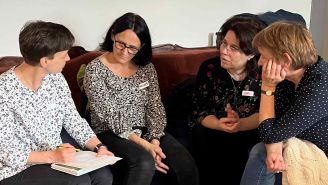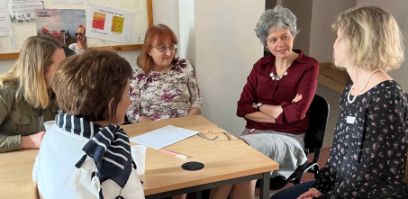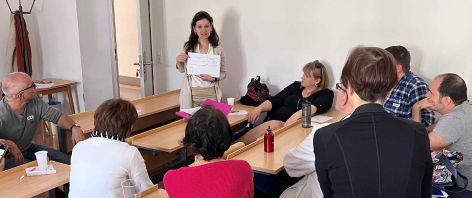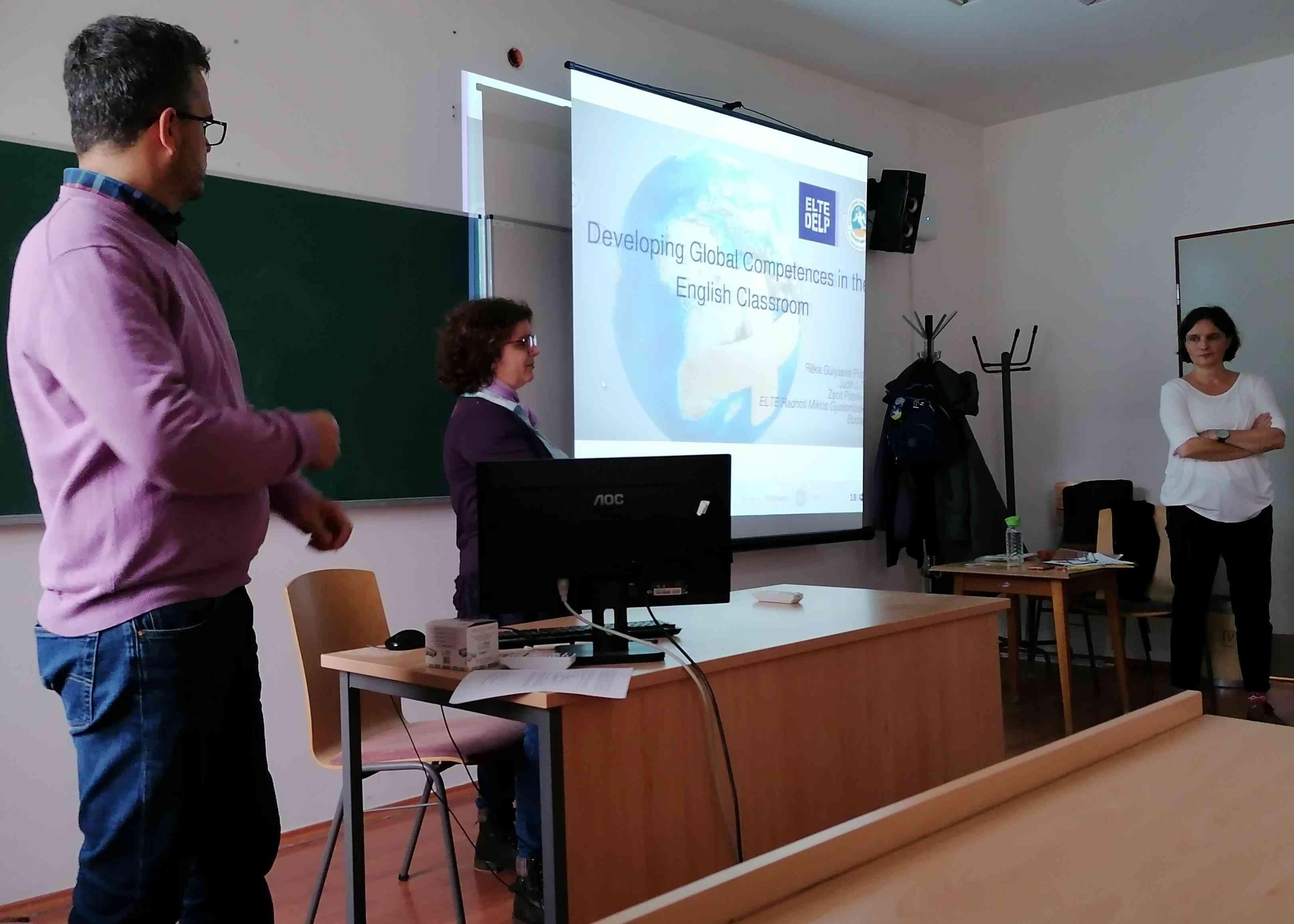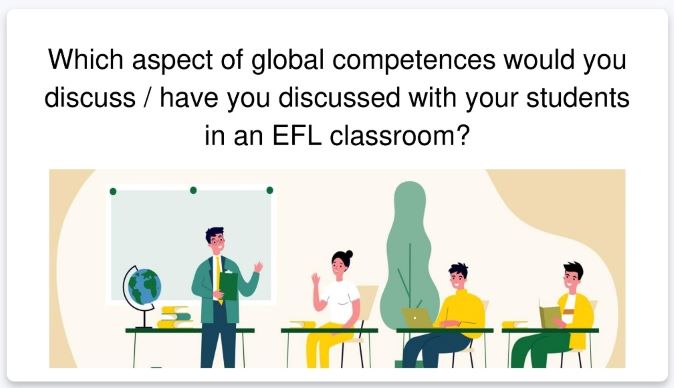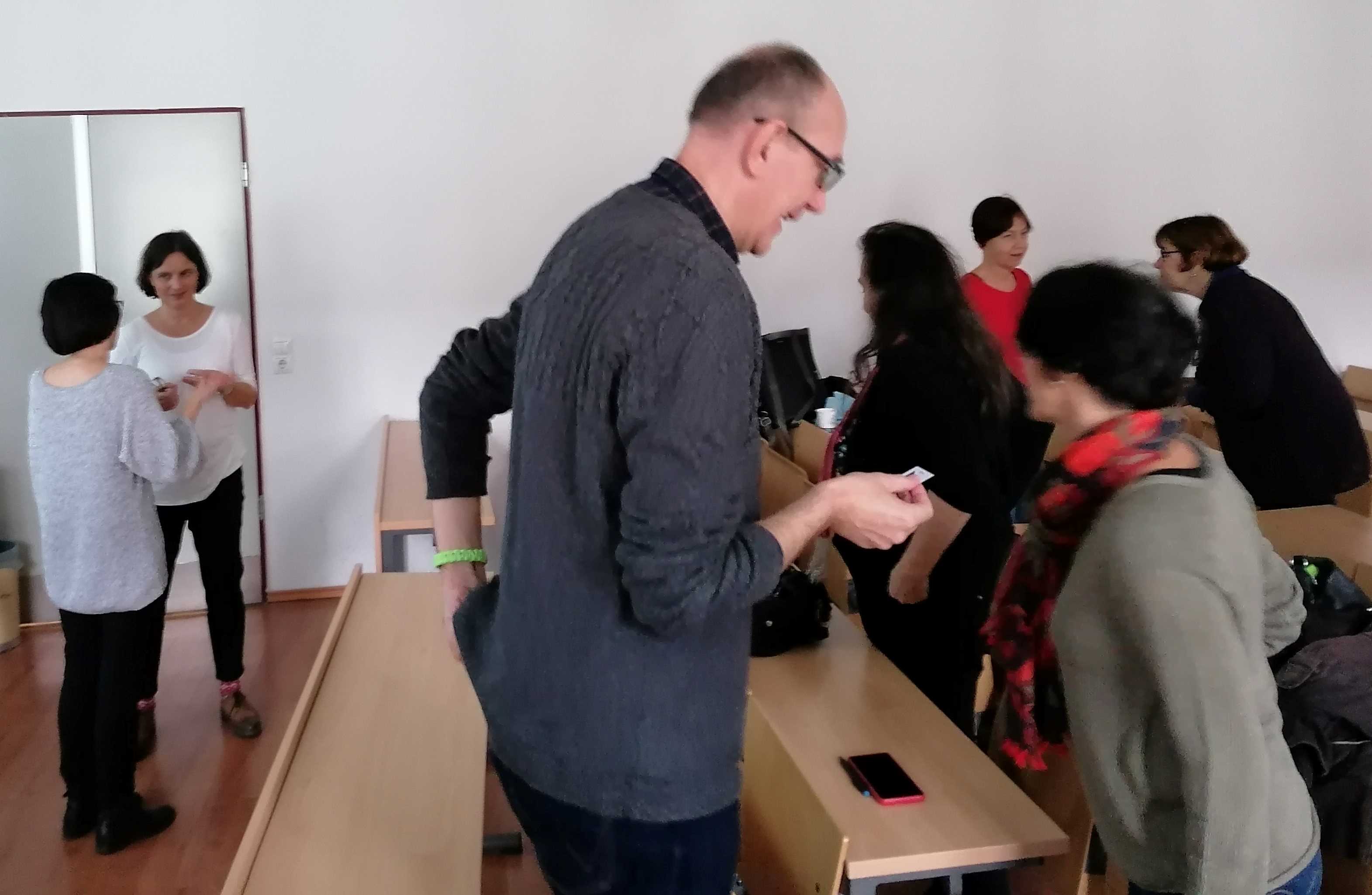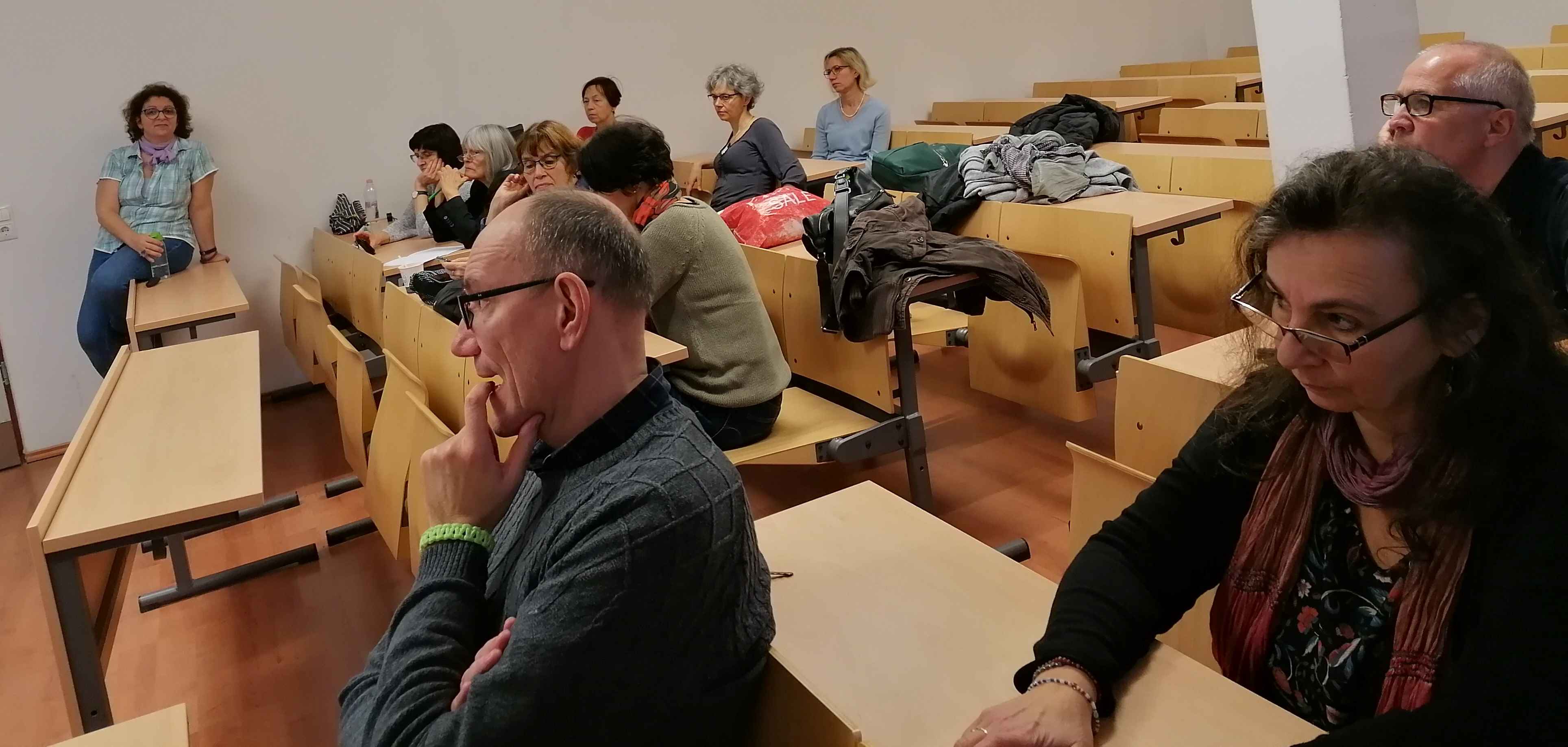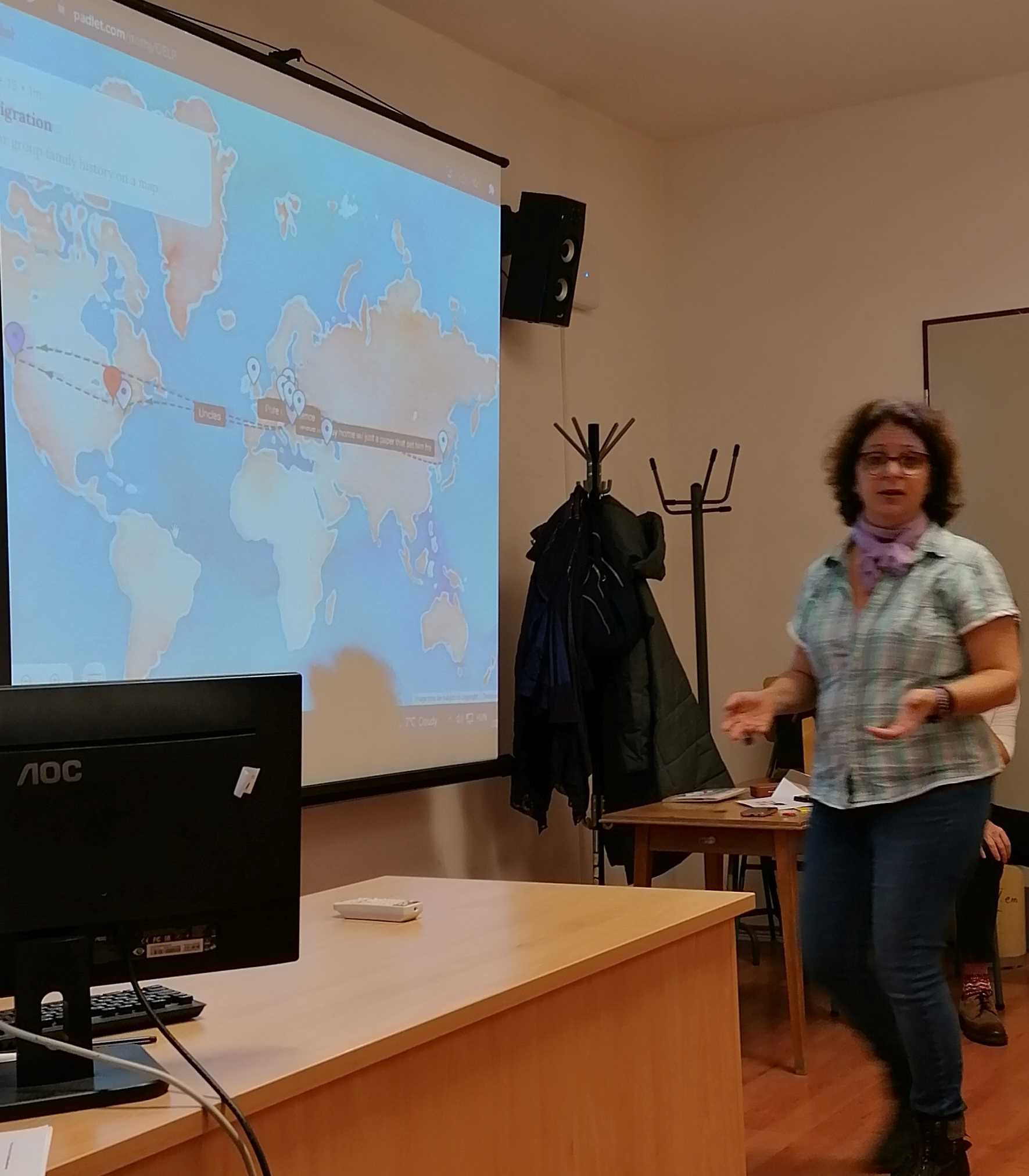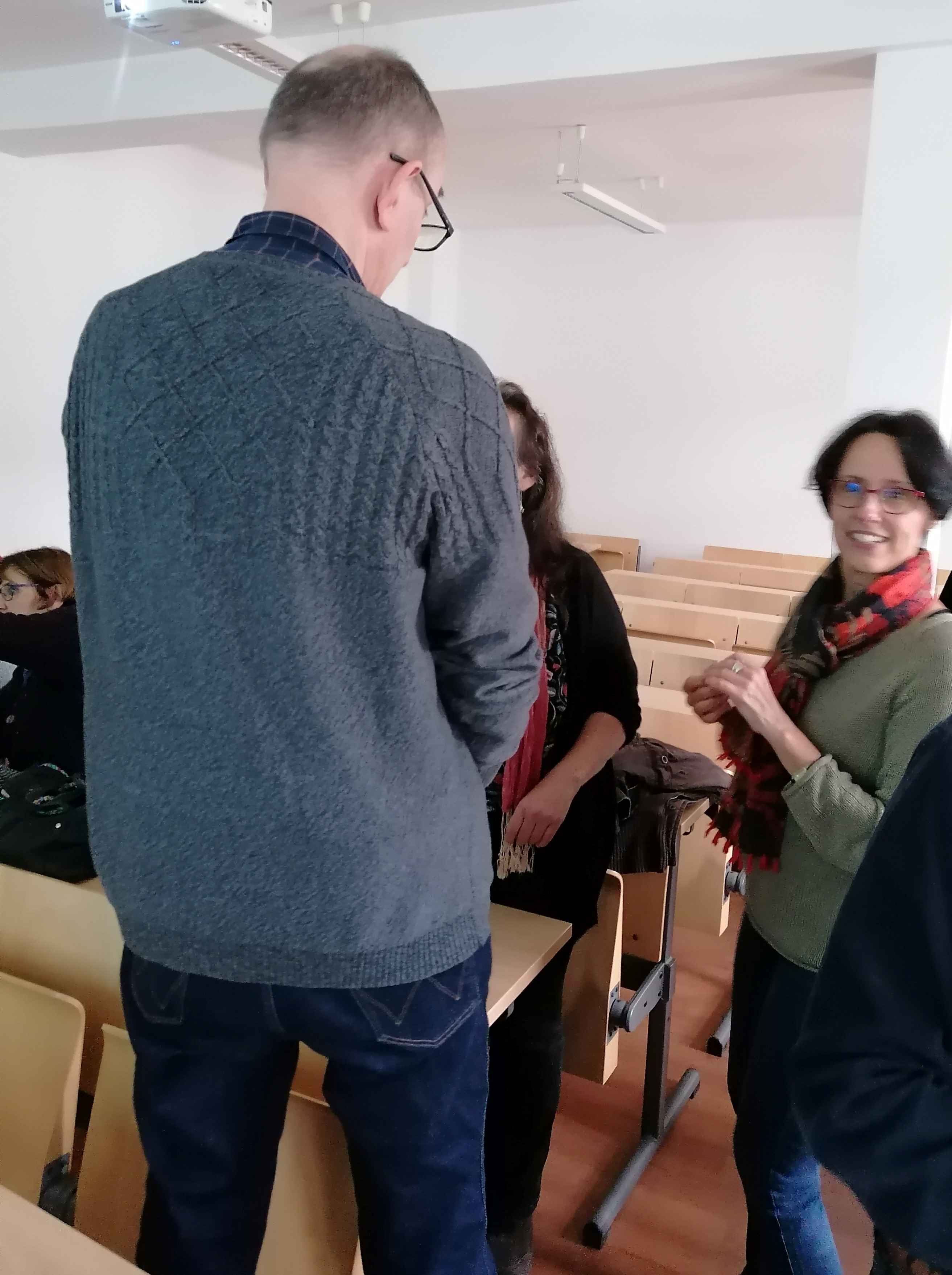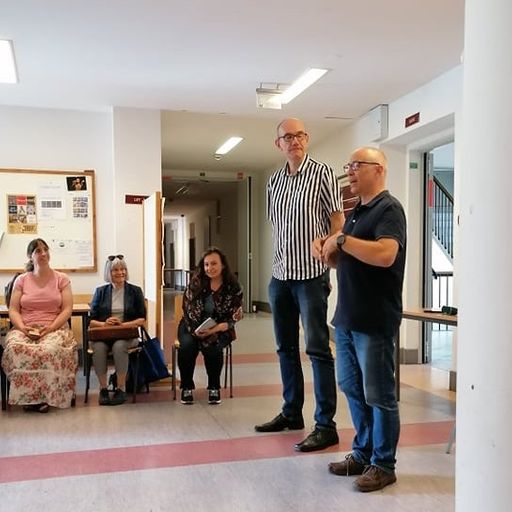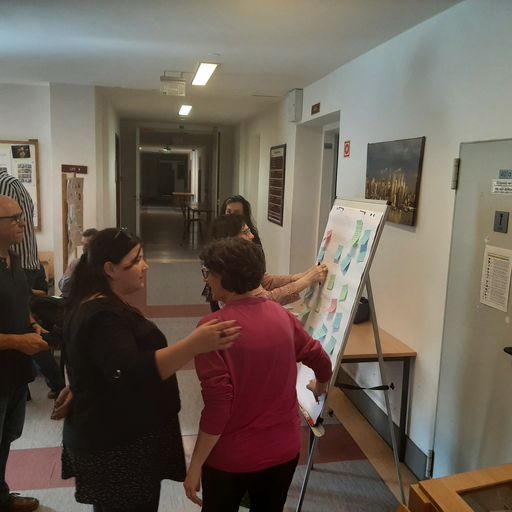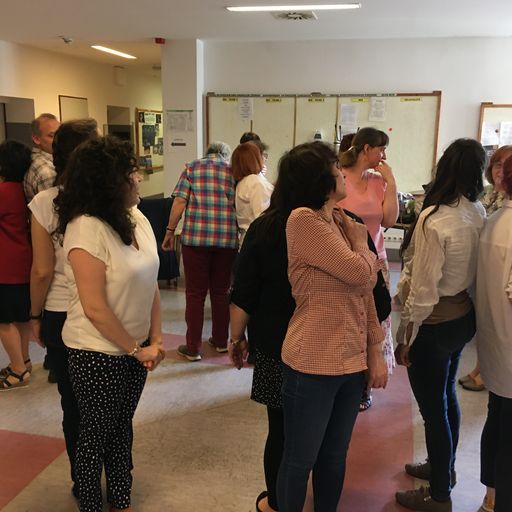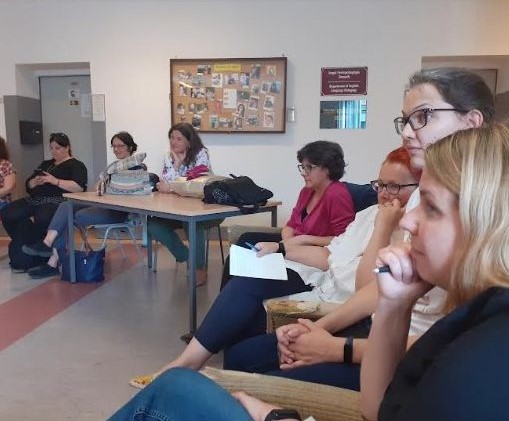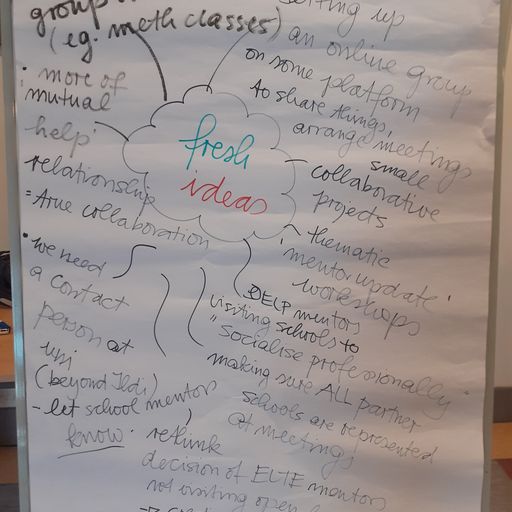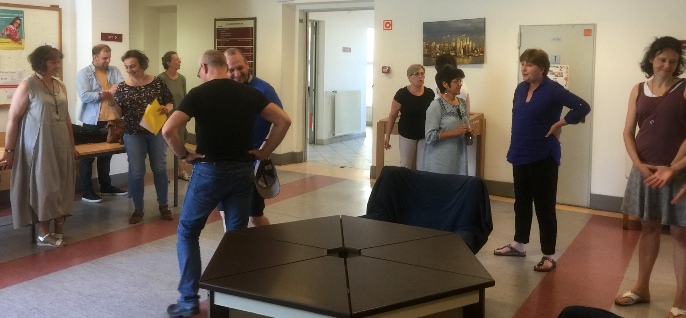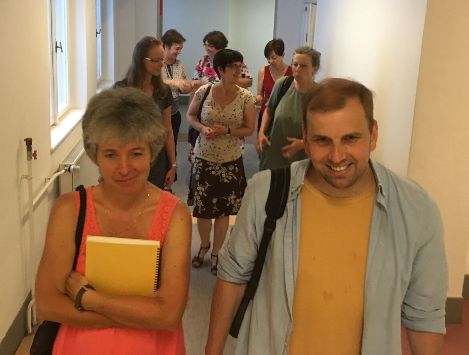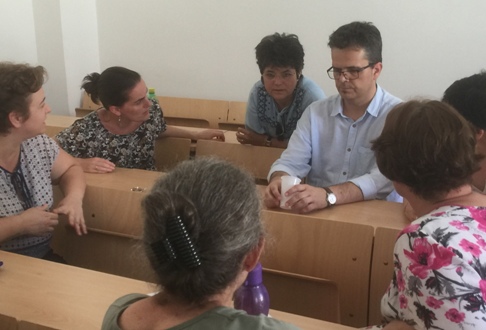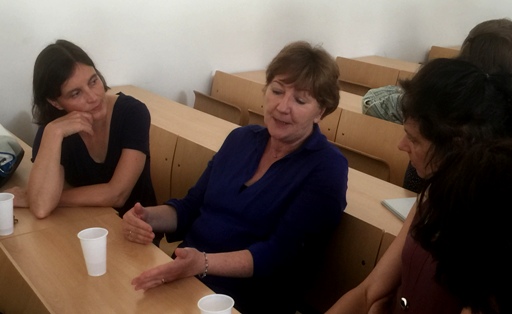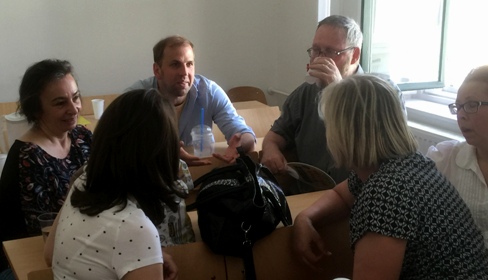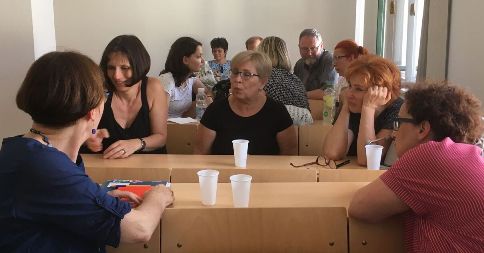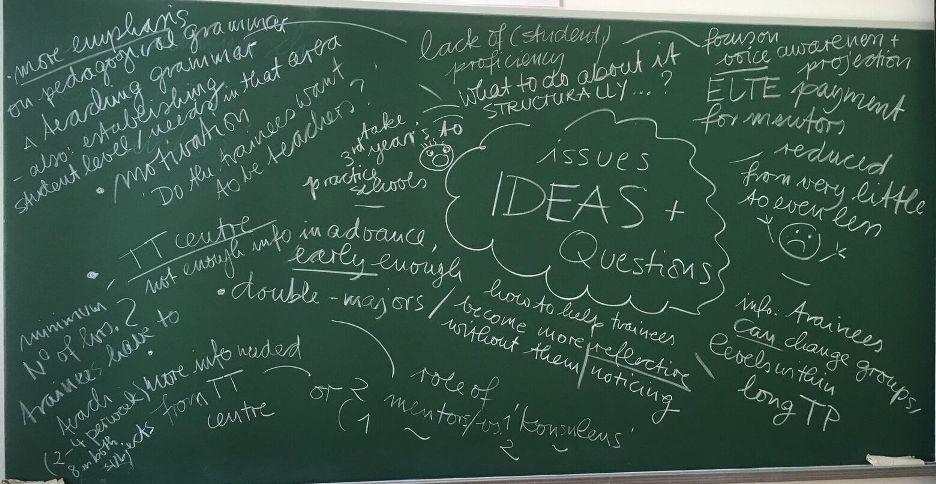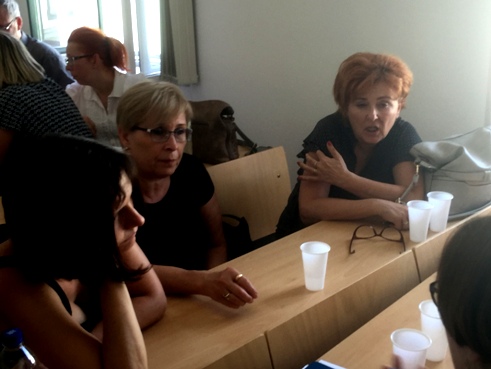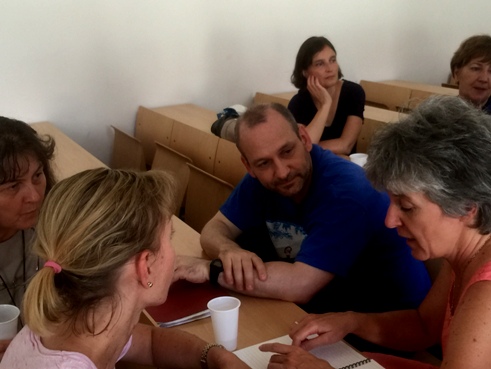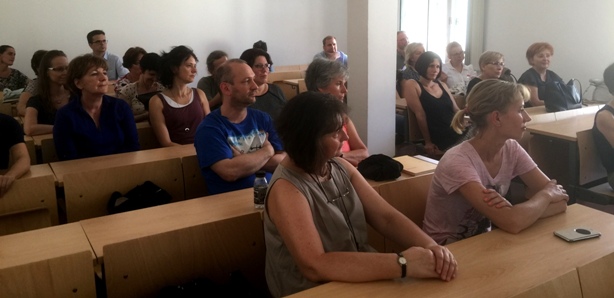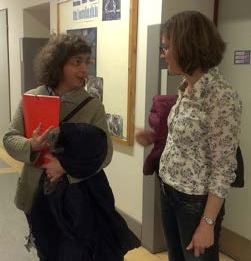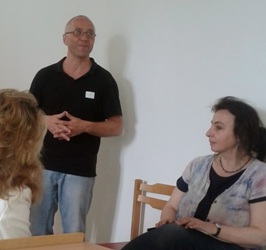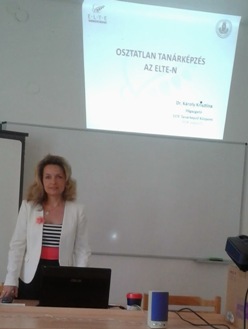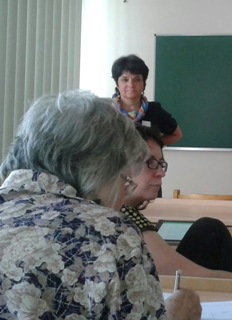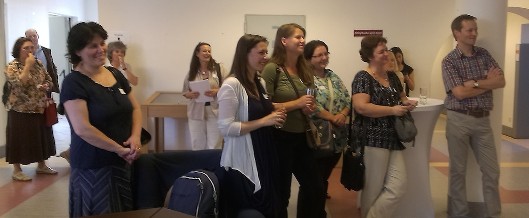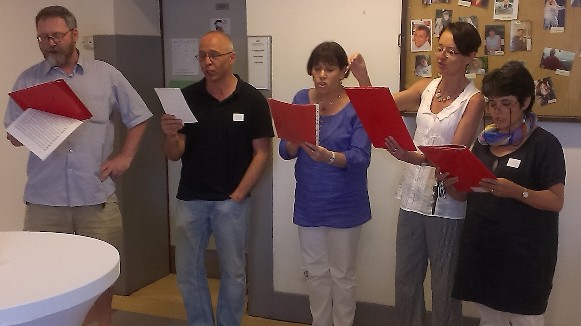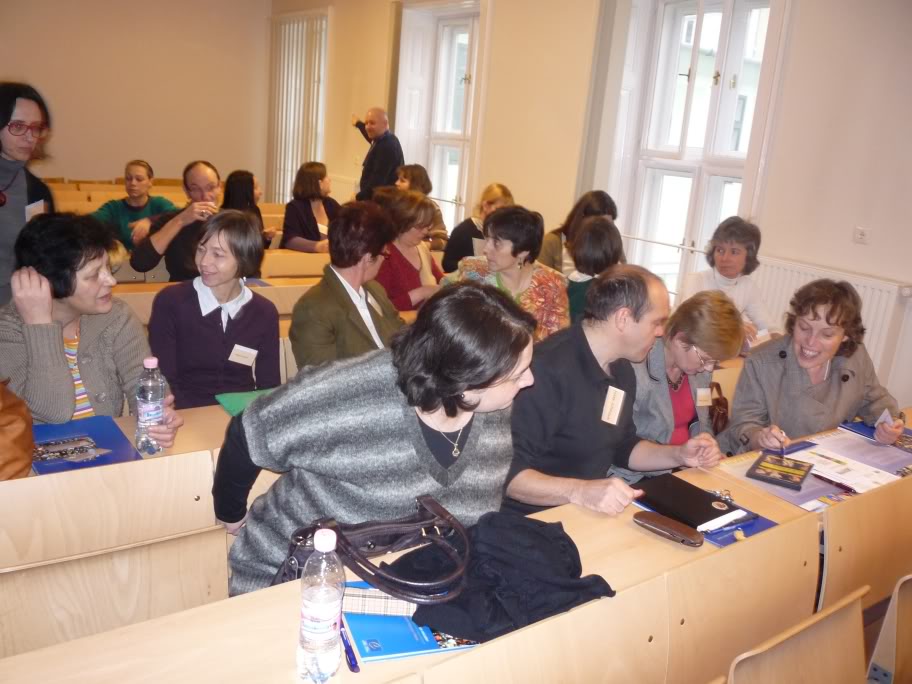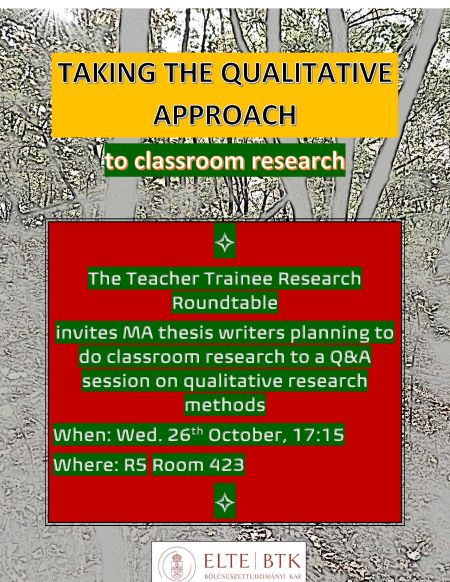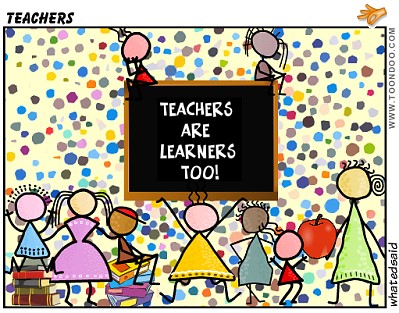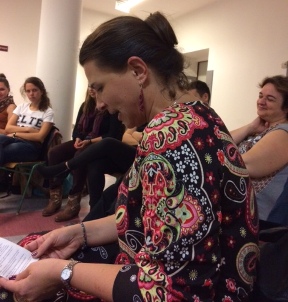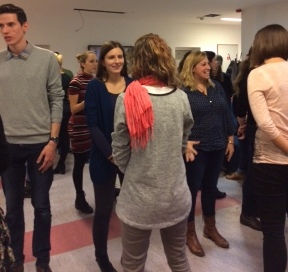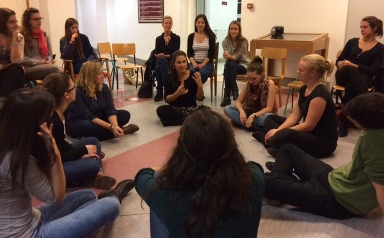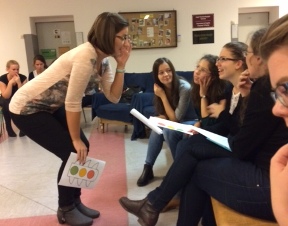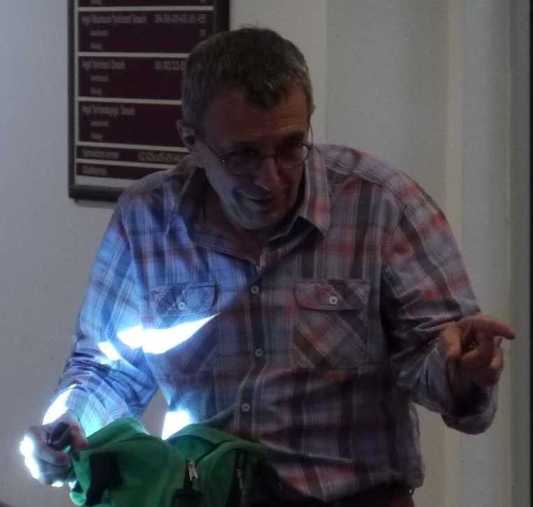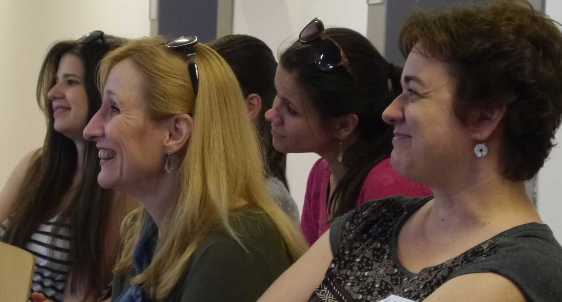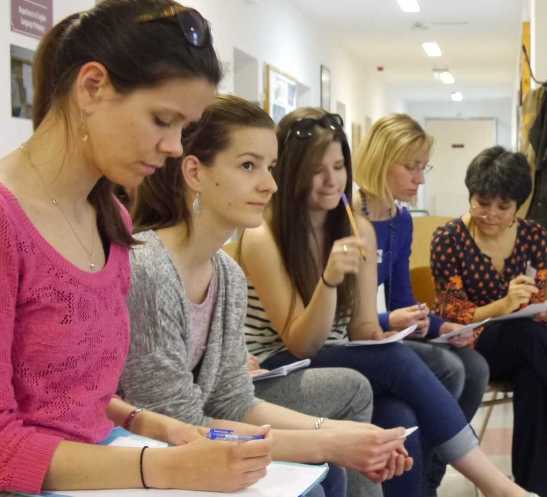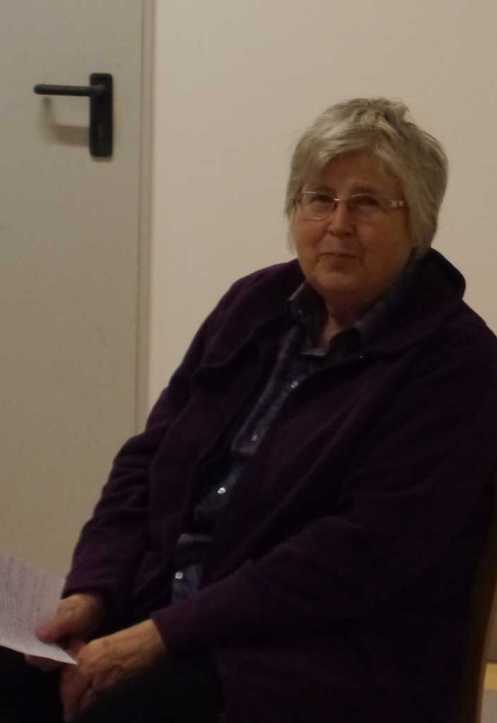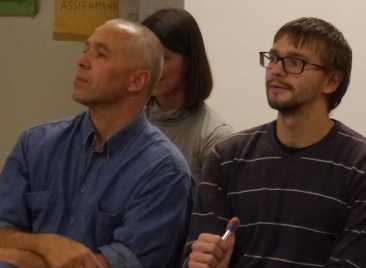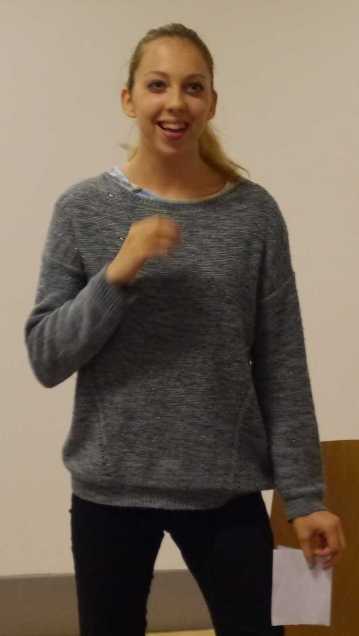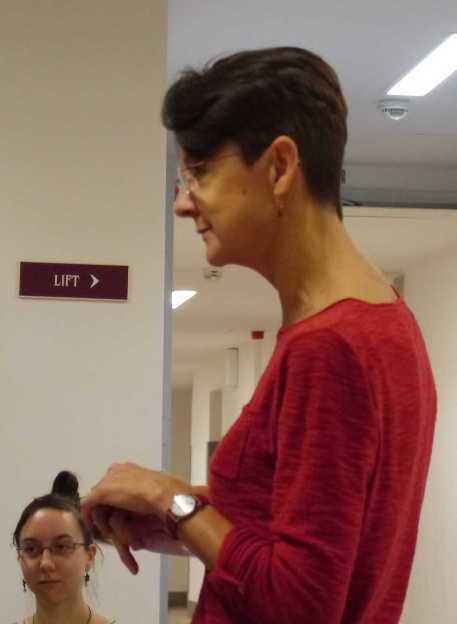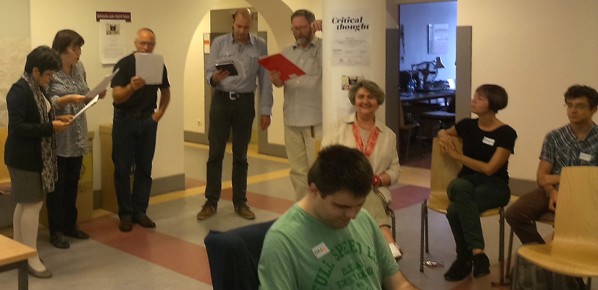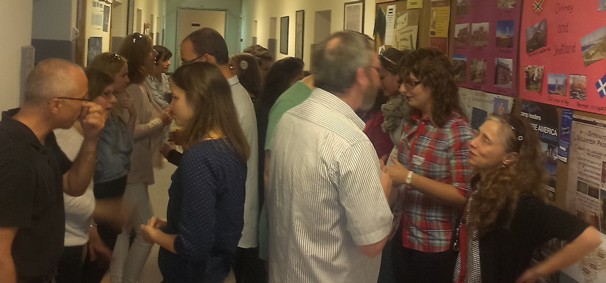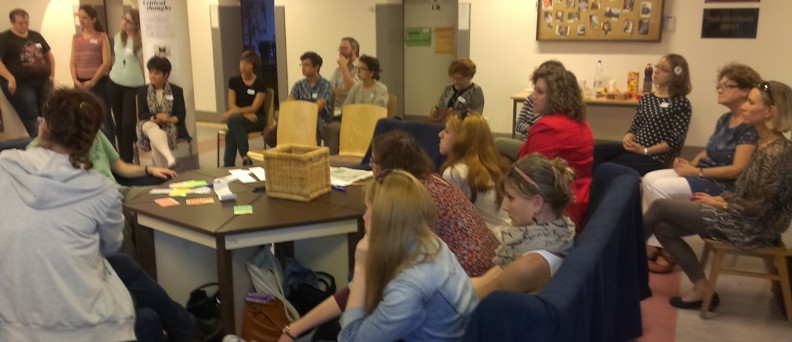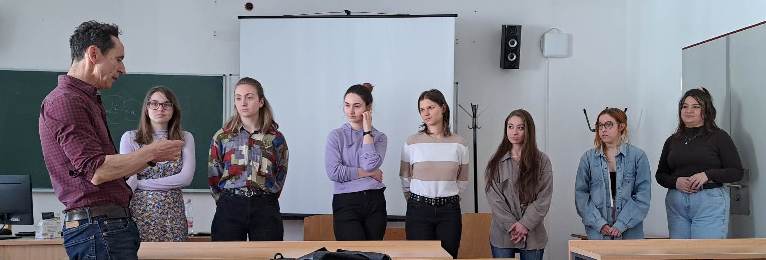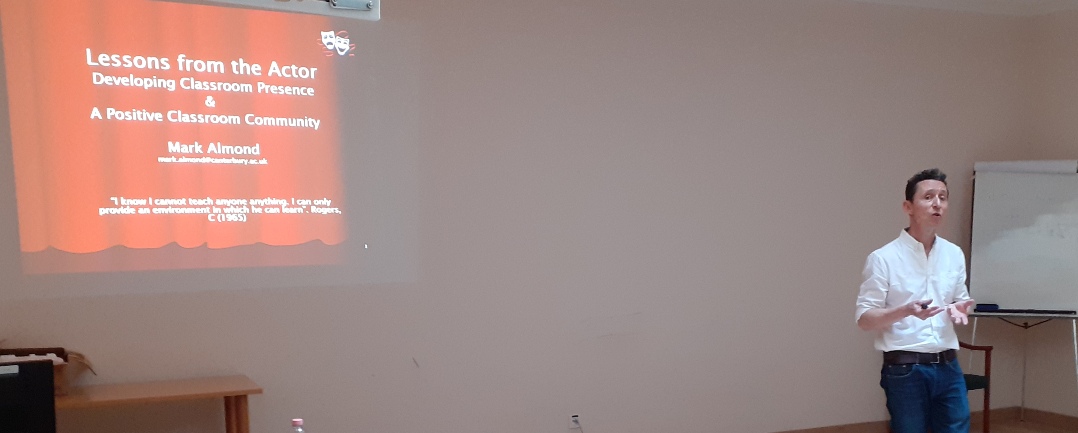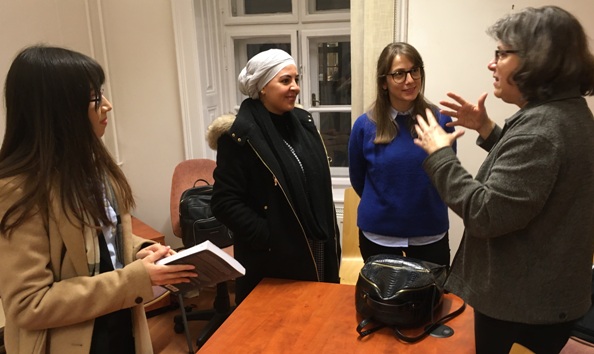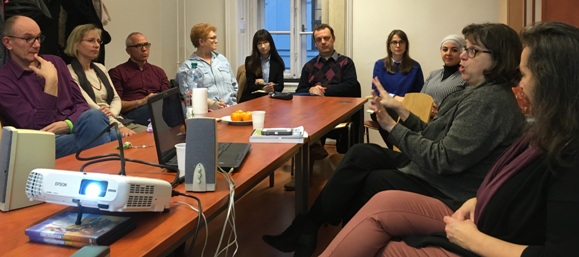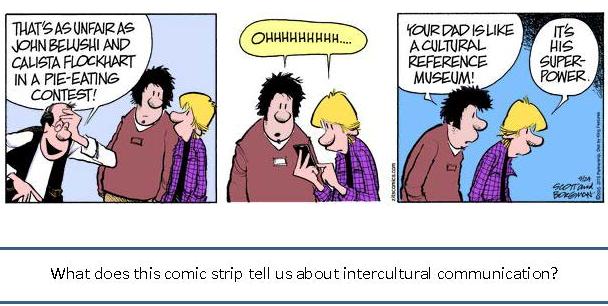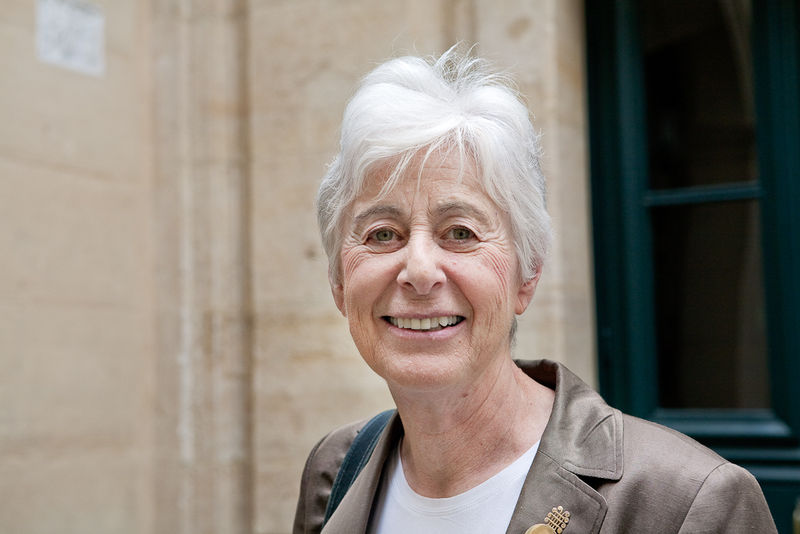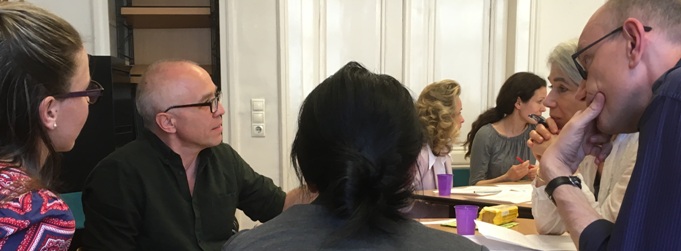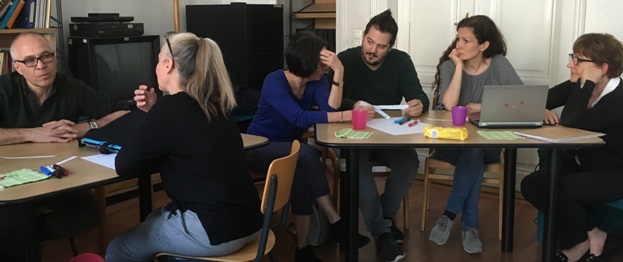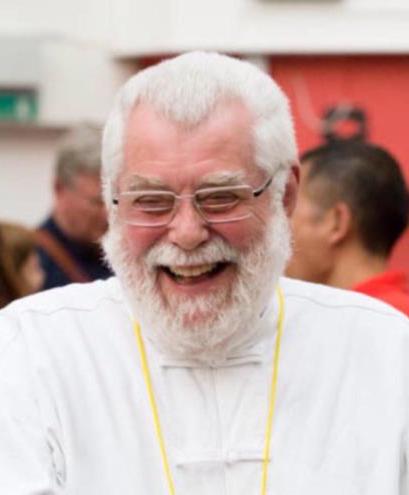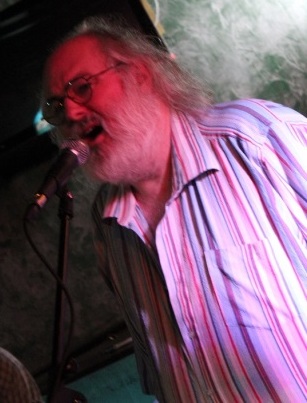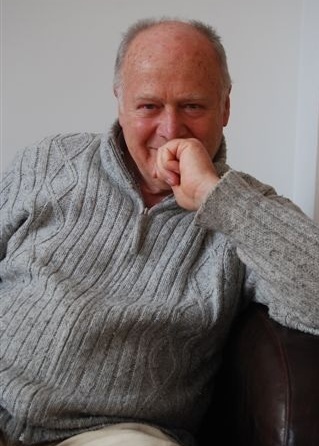|
|
Department of English Language Pedagogy School of English and American Studies - Eötvös Loránd University 1088 Budapest, Rákóczi út 5. tel.: (36-1) 485 52 00 extension: 4407, email: delp@seas3.elte.hu
|
||||||||||||
|
MA in English Language Instruction
|
The events on this page are listed in thematic grouping and in reverse chronological order.
SEAS Think Tank on student language needs
Social Events (The links lead to a new sub-page) Social Awareness Raising Initiatives In-house Celebrations and Events
Diversity Day Events (formerly Tolerance Days Events) aim to raise awareness of social issues related to professional English language communication. The events comprise workshops, lectures, film screenings, etc. You can also find us at: https://www.facebook.com/eltedelpdiversity
Diversity Day Event, 23 April, 2024
This Diversity Day event at ELTE DELP bore the title: Making sustainability a mindset. The activities and ideas for further consideration were presented by our DELP colleagues Margit Szesztay, Rita Divéki and Éva Major as well as Peter Holly (Freelance teacher trainer from Kaposvár).
We heard about important concepts related to sustainability, were given an overview of the 17 goals of sustainable development, we enjoyed activities to discuss ways to develop our approach to sustainable living, and were also given the opportunity to consider teaching activities to combine language and content teaching. Finally, we heard about the CHARM-EU Programme, which is the Challenge-Driven, Accessible, Research-based and Mobile model for the co-creation of a European University aligned with the European Values, the European Green Deal and the sustainable development goals. (https://www.charm-eu.eu/ )
A few interesting resources that were mentioned are as follows: https://www.carbonfootprint.com/ Peter Holly: Learning for a sustainable future Paulo Freire: The Pedagogy of the Oppressed Paulo Freire: The Pedagogy of Hope Bill Gates: How to Avoid a Climate Disaster Christopher Graham: 50 Ways to Be a Greener Teacher Greta Thunberg: The Climate Book
Diversity Day Event, 16 November 2023
Our Diversity Day event was held at ELTE DELP on November 16th in cooperation with the Visual World Foundation. Activities centered around diversity in the family through photographs from the Fortepan Hungary and Fortepan US Archives. Ildikó Lázár led us through activities in which we had to make guesses about people's lives and their power relations based on the projected old photos, think about changes in values, become aware of the diversity in our own families as a result of our ancestors' and our own travels, and understand and appreciate the value in photo archives with the help of Fortepan pictures and videos.
Diversity Day Event, 27 April 2023
Autonomy for physically disabled people - This workshop highlighted the difficulties physically disabled people face in their everyday lives, which they can overcome if they are given more support from society. The presenters chose different film extracts as springboards for discussing issues of communication and support. They are also shared their stories and how they manage their lives so that they can live up to their full potential against all odds. They are both members of an activist group which aims to make it possible that disabled people can live autonomous lives. At the end of the workshop participants had an opportunity to try to operate a wheelchair, a fairly challenging task.
Diversity Day Event, 3 November 2022
Living Library
This year’s Diversity Day included an interactive, face-to-face Living Library event. Students could confront their prejudices in a “library” where books were people. They could ask any questions from the following “Living Book” volunteers: blind (and her guide dog you can see in the picture below), vegan, Jewish, transgender woman, asexual, gay, bipolar, and autistic person, who were all happy to share their stories. The participants had twenty-minute-long conversations with three Living Books. These are some thoughts students wrote in the feedback sheets: “The organization fills a huge gap, and it is a great idea to talk to people about issues and life defining events these people experienced; the English part only added to the experience. Thank you ❤” “I felt safe and open, I had the feeling that I could ask anything without any judgement.” “I felt supported and all of my questions were answered.” “I would say I was very surprised. I liked how the conversation made me talk and hear about something I never heard before.” “It was nice to meet someone like her, and learn that there are other people like me, and I'm not just strange.” The Living Books shared some similar thoughts after the event: “I love when readers have the courage to share their experiences because today I felt that I could really help. In all of the discussions I met interested and open minded people with whom we had uplifting conversations filled with empathy. Thank you!” “Open minded, intelligent, sensible people with the right questions and inputs. I am glad that we have met.” The event was organized by Márta Barbarics who also volunteers in the Living Library. If you would like to organize similar events, you can contact her at mabame@staff.elte.hu or the organization through their Facebook page: https://www.facebook.com/EloKonyvtar
Diversity Day Event, 4 November 2021
This year's Diversity Day event was held face-to-face again, and it focussed on Social Movements
The presentations were given by Amy Soto, Frank Prescott and Andrea Thurmer, and encompassed a large range of social movements. This interactive event engaged the audience and made us realize how social movements around the world are related and how they promote social progress through people's efforts and commitment.
Amy Soto talked about the Black Lives Matter (BLM) movement, its history and relevance. Frank Prescott then discussed the various reasons and movements leading up to the Extinction Rebellion and the Insulate Britain movement. Andrea Thurmer's presentation tackled the grassroots movement Idle No More aiming to improve the lives of the indigenous peoples of Canada. It was fascinating to see the various approaches these protest movements use to get their message across from mass rallies, through flash mob events or civil disobedience to non-violent direct action.
Click on the picture of the title slides to see the pdf of the slideshows:
Diversity Day Event, 5 November 2020
Because of the COVID19 pandemic this event was held online. The event itself was very diverse in the topics that were presented: First, Dorothy Hoffman gave a presentation about coming of age rituals among Canadian First Nations’ youth.
This was followed by looking at idioms based on sports around the world using examples from the international participants, too. This activity was moderated by Frank Prescott who also gave a short presentation to kick off the game.
The event was closed by an introduction to the beautiful English game of cricket by Julian Salanki.
Diversity Day Event, 7 November 2019 - Diversity of languages and writing
This semester's Diversity Day was held at ELTE DELP on November 7th. Contributions and activities centered around diversity in languages and writing styles. Ildikó Lázár introduced the event getting us to write the word 'diversity' in Japanese with our less dexterous hand. Experiencing having difficulty at the level of just copying was fun as well as a good intro to the ensuing presentations. Réka Fehér gave a presentation on the SEAS Writing Center's work to inform students about the type of support it offers and the types of difficulties students have in academic writing. Dorottya Holló talked about how people organize their thoughts in writing and what writing styles they typically use in different parts of the world. Finally, Andrea Thurmer facilitated an activity in which we had to guess the meaning of sentences in a diversity of languages.
Diversity Day Event, 11 April 2019
This semester's Diversity Day was held at ELTE DELP on "Advocacy and empowerment through Wapikoni documentaries by indigenous Canadians" with support from the Visual World Foundation.
A powerful opening speech by H.E. Isabelle Poupart, Ambassador of Canada to Hungary opened the event. This was followed by the screening of five short Wapikoni documentaries and small group discussions facilitated by Ildikó Lázár to explore issues of identity, diversity, acceptance and empowerment.
You can find some of the films we screened such as "Where are
your Feathers?" or "The Routes" on the Wapikoni website: http://www.wapikoni.ca/home
Human Rights in the English Language Online Sphere
15 November 2018 saw another Diversity Day event, this time focussing on human rights in the English language online sphere, and more particularly on hate speech and ways of dealing with it. The presenters were Rita Divéki (Language Pedagogy PhD student and DELP colleague) and Laura Seben (final year BA in English student). They used their own materials as well as some activities from a Council of Europe publication: "Bookmarks - A manual for combating hate speech online through human rights education". (Click on the title for a pdf version.) An initial activity about expressing views concerning the freedom of speech was followed by a presentation about types and features of hate speech as well as ways of combatting it. A group activity of classifying some instances of hate speech had the audience discuss the issue more in depth considering the content or tone of the statement, the intent of the person making it, the target audience that the statement is supposed to reach, the context of the utterance and the impact that the statement might have. The presentation was followed by a short discussion. The pdf of the slides of the presentation are available here.
Posters created by Farnaz Ghandi, 2nd yr BA in English student
Women and Work Equality Tuesday, 6 March 2018
The event was convened by Cecilia Gall who was also the lead presenter. The session focussed on various aspects of gender (in)equality in work related situations and public perception. Following some spectacular statistics and images of women in different jobs around the world, we saw a recording of a TED Talk entitled "Are you biased? I am" by Kristen Pressner (https://www.youtube.com/watch?v=Bq_xYSOZrgU), who made us realize that no matter how open-minded we think we are, we all have deeply ingrained bias. To see another aspect of this, the audience tried out The Harvard Implicit Bias Test, which is available at: http://www.implicit.harvard.edu/. (We took the Gender-Career test but there are many other topics, too.)
The following videos were concerned with the representation of females in children's stories (https://medium.com/@chandlerholland/the-ugly-truth-of-childrens-books-5af0a557fba4) and women's professional ambitions. This second talk was delivered by actress-producer-entrepreneur Reese Witherspoon. Continuing the topic of ambitious women, our student presenter, Laura Barsi talked about Jacinda Ardern (https://www.youtube.com/watch?v=Ds8HGJlnKCQ), New Zealand's current (and third female) prime minister, who - besides all the congratulations - has recently been attacked and treated irrespectfully in the media for not being able to serve her country well as she is expecting her first child while in office (http://www.dailymail.co.uk/femail/article-5293227/LIZ-JONES-pregnant-PM-betraying-voters.html, https://www.youtube.com/watch?v=IK9nBH2vBiQ). At the same time it was interesting to see two photos of the NZ government in 1981 and 2017 showing how all white male composition of cabinets has changed and the current government represents both genders and a variety of backgrounds. (N.B. Currently the Canadian government is the most diverse one.) It is almost unbelievable in the 21st century that politicians in very responsible positions still believe they can display misogynist views. An example was shown from a session on the gender pay gap at the European Parliament in 2017, where Polish MEP Janusz Korwin-Mikke launched a sexist tirade against women and equal pay. (https://www.youtube.com/watch?v=40hhc0cjYyg) The gender pay gap is a very real problem even in the most developed countries. In the UK women earn 18% less than men. The last video of the event showed a playful attempt to raise the awareness of customers in a London pub of the gender pay gap by charging men 18% more. The "Man Tax" video is available here: https://vimeo.com/244068985.
poster by Eszter Gall
Experiencing Cultural Diversity at University 23 November, 2017
This event started by three students sharing some of their intercultural experience. Anna Kruppai, Zsófia Baranyai and Tímea Mihály told the audience stories that all pointed to the importance of learning about practices and values of other cultures, of being open and curious, and of initiating contact between people of different cultures.
The next activity was led by Dorottya Holló. The audience worked in small groups and shared positive and negative experience they had connected to diversity (mostly) at university. Then they identified things that they have learnt due to living, studying and teaching in a diverse context and things that they - and we all - still have to learn. The slips of paper where these were written down were collected and a few ideas are listed here. Please note that the ideas have been summarized as many of them were quite similar.
Positive experience of diversity: People are open and approachable; new languagues and ideas can be learnt; learning about different cultures; people connect easily, are curious, accepting and understanding; collaboration between students of different cultures in classes; experiencing different approaches and attitudes from one's own; making friends; ESN - Erasmus Student Network; useful to experience working with people with disabilities in class; enjoying diversity; learning about other people's perspectives and mindsets;
Negative experience of diversity:
Different
students have very different approaches to and practices of
studying, responsibility, arriving on time, plagiarising, class
discussions, eye contact, nose blowing, personal space,
assertiveness, and so on, and this can be strange, uncomfortable
or sometimes irritating; some other comments: people are not
open; difficulty of understanding some accents; some people
suffer from being shy and nervous communicators; someone wrote
about an African student who was attacked;
Things we have learnt from experiencing diversity at university: accepting and embracing difference; not to be afraid of the unknown; being open, tolerant and accepting; being careful with our words; What is obvious to me may not be obvious to someone else; different ways of respecting others; treating others as we want to be treated; It is easy to build bridges btw people; balancing between the truth value and the misconceptions of stereotypes; It is better to ask questions than to assume things; people have different priorities; patience; empathy; not being judgmental; the importance of learning to learn and of always wanting to learn; questioning our own values and practices; thinking "outside the box";
Things we still have to learn to enhance our experience of diversity: to be nonjudgmental; how to get rid of stereotypes; how to approach people; how to let go of some of our ideas; how to find common ground with others; not to judge on the basis of first impressions; to be more aware of different needs; to make information more easily accessible to international students (in English); to be more optimistic; to socialise more; to be more patient, how to deal with not understanding certain accents; how to motivate students to do what they are not accustomed to do;
The last activity of this Diversity Day Event was "Speed Dating" conducted by Ildikó Lázár. The participants were paired up and were given cards containing statements about how teachers can create a democratic learning environment to promote the development and growth of intercultural competences, i.e., attitudes, knowledge and skills that allow to have responsible, reflective, open, inclusive and positive relationships with others around us. The partners and the cards shifted after a few minutes, so we all had the opportunity to talk about a number of issues to various people. The topics discussed are not only valid for classroom contexts! Here are a few sample cards:
You may also like to visit: http://www.learntochange.eu/2017/02/21/cards-for-democracy/
Diversity - Discrimination - Media 28 March, 2017
Contributing students: Patricia Ortega, Dávid Hollós and staff: Ildikó Lázár, Christopher Ryan, Cecilia Gall, Dorottya Holló
The hyperlinks in the following account lead to the resources that were used in the presentations.
As the opening of the programme, Ildikó Lázár showed pictures of diverse fauna and flora, landscapes and forms of our built environment, and mentioned the diversity of languages which we are all fascinated by. Why is it then that human diversity is not always appreciated and often leads to animosity and clashes?
In the hope of giving a brief overview of both discrimination and appreciation on the basis of cultural, gender, social and ethnic differences, we looked at how these issues appear in the media and public discourse. Having watched a commercial shown by Dorottya Holló for a Danish television channel pointing out things that connect people despite their differences, the members of the audience tried to find unexpected similarities between them. Our audience was really diverse and seemed to have enjoyed the event:
The next video, The DNA Journey, was a short summary of a project demonstrating that despite our national identities and stereotypical value judgements, our DNA shows that we have our roots in diverse cultures. As one of the participants of the project says: "This (i.e., a DNA analysis) should be compulsory. There would be no such thing as extremism in the world if people knew their heritage... Who would be stupid enough to think of such thing as a pure race?" The motto of the clip is: "An open world begins with an open mind."
Christopher Ryan then showed a short video made by Chinese students at Columbia University. They explain what their names mean and we find out that as opposed to European name giving customs, the Chinese give their children individual names that often express hopes and aspirations. The video clip was made in protest to xenophobia at the university.
In the following part of the event Dávid Hollós reported on a campaign by Muslim Americans to repair a vandalised Jewish cemetery. This fund raising campaign and cooperation between two groups that stereotypically display ill feelings towards one another is an eloquent example for reconciliation and ways to fight hatred and violence. More information can be found at these links: 1, 2, 3.
Patricia Ortega showed her own slides when she talked about extreme forms of discrimination and ill-treatment of women. In her talk entitled "Lethal Gender Bias - The fight for women's rights around teh world is far from over", she talked about honour killings, unhygenic sterilisation of women, sex selective abortion and human trafficking forcing women into prostitution or slavery. These are not just acts of discrimination but crime, and are practiced mostly in Muslim cultures, China and India. The weight of the topic had a dramatic effect on the audience.
Women are still not regaded as equals in the west either. Cecilia Gall's sent us clips that threw light on a number of aspects of discrimination. The first one reported on a sexist tirade against women by Polish MEP Janusz Korwin-Mikke in the European Parliament. The MEP was fined for airing his opinions, but discriminating views still persist widely and sometimes in hidden ways. This is the case in how women are represented in literature, and even children's literature as illustrated in "The Ugly Truth about Children's Books". Finally we listened to Annie Lennox encouraging men to be feminists in an interview.
Advertisements are very powerful in shaping the way people think. Dorottya Holló called attention to a few examples. The Audi advertisement at the Superbowl in 2017 tackled the issue of equal opportunities and equal pay for women as a commitment to progress. The Coca Cola advertisement screened at the same event highlights the multiculturality of the USA. As a summary of the celebration of diversity, a video of the "Love has no labels" movement against bias was shown. The last picture at the event was that of "short haired twins". The story that was shared by the mother of a four-year-old proves that bias and discrimination are not part of human nature but are learnt through socialisation. If only this learning never took place! - In her closing words Ildikó Lázár gave the audience some home work and encouraged everyone to speak up when they see injustice and discrimination and take every opportunity to talk about the values of diversity as this may be a tool for promoting acceptance in our world.
Benefitting from Multiculturalism 17 November, 2016
The event started with a presentation by students attending a content based language development course called 'Australian History and Diversity'. Nikolett Fejér, Dávid Gál, Tímea Kilián, Dorottya Szentesi, Fanni Snekszer, Vivien Deák, Boglárka Nagy and Noémi Réti first gave a brief overview of historical events and milestones in Australia that shaped the country's disposition from racism and exclusion to acceptance and multiculturalism. The students finished by reciting personal accounts written by Australians of different backgrounds about their experience of cultural clashes, culture learning and harmony in diversity.
In the second half of the programme, Ildikó Lázár conducted interactive games to raise awareness of important issues related to how people view themselves and others. In the first activity the participants created an 'identity card' for themselves by listing a few important features of their life, like name, language, profession, family status, etc. Then they had converations with others in the room but could not refer to any of the concepts on their 'ID cards'. In the follow up discussion we drew a parallel between this simulation and a very real situation in life, that of refugees who have to leave so much of their identities behind to be judged only as refugees... The second activity was a role play where some audience members donned the persona of different people from very lucky and not so fortunate family and social backgrounds. They then stood in a line and were told to move forward if certain statements that were read out were true about them. The statements referred to various opportunities in life, like having a good education, a supportive family, a good job, etc. The rest of the audience did not know who the players were supposed to be but based on where they stood, it soon became clear what backgrounds they came from. The game provided a good opportunity to discuss social inequalities.
A Diversity Day Spin Off: a training session on how to read exams for blind/visually impaired students
As a follow up to our previous Diversity Day Event (see just below) and at the invitation of Kimmel Magdi, on 1 December 2015 Mária Flamich and Rita Hoffmann - non-sighted teachers of English - conducted an immensely useful workshop for DELP staff on reading out tests to blind/visually impaired students. Some of the advice we received is as follows:
- expect to spend at least twice as much time on
an exam that is read out than on a written exam.
- read out collocations together and not separately within a
text e.g. set out a massive explosion / ignited a massive
explosion / set off a massive explosion ... which one do you
think is incorrect? as opposed to just saying "set out or
ignited or set off a massive explosion... which is incorrect?"
- emphasize if it's the one correct answer or the one incorrect
answer that the student has to choose
- not read out everything automatically twice, ask if a second
reading is needed and helpful
- (with tasks incorporated in longer stretches of text) offer to
read out the whole paragraph first before concentrating on
details
- rephrase the instructions - if need be- to render them as
comprehensible for visually impaired/non-sighted people as
possible.
- (in the case of multiple choice tasks) read out all the
versions in full sentences so that the student can compare
them.
- (in case of a gap fill task) indicate the gaps by knocking
so the student can have a clear concept where the gaps are.
- ask the candidate at the very end of the exam, if she/he
would like to get back to any part of the exam.
Focus on teaching students with special needs A very successful event on 22 October, 2015 organised by Cecilia Gall and Magdi Kimmel of DELP, this afternoon attracted an audience representing both SEAS students and staff. The programme aimed to highlight the ways students with special needs can be helped in the EFL classroom and beyond. The event started with a very special dance performance, a *flashmob* by two dancers from ArtMan Association, Kata Kopeczny and Károly Tóth (http://artman.hu/en/kik-vagyunk/tagok/). ArtMan’s motto is to create a common space for creativity with the help of dance and therapy, incorporating our values and our disabilities, for a more inclusive society. Karcsi completed his BA in History at ELTE, currently studying for his MA in theatre studies at Károli University. After the performance Kata and Karcsi stayed for a short Q and A session and talked a little bit about the therapeutic work that is accomplished in the studios. There is a short film about Karcsi at this link: https://sikerstory.hu/talentn/szechenyi-2020-talentn-toth-karoly (in Hungarian). We hope to be able to post a video of the event at a later time.
The performance was followed by a discussion with the dancers led by Dóra Csikós of DES, member of the Faculty’s Equal Opportunity Committe. Dóra then went on to describe the work of the Committee and called for more students to volunteer as peer helpers.
Following Dóra’s introduction, Edit Kontra, Katalin Brózik-Piniel and Kata Csizér of DEAL gave an interactive presentation about the myths teachers and students have about deaf students, and the best ways of helping them. For example, it is best not to stand in front of the window when talking to a Deaf student, as sharp light coming from behind a person makes lip reading more difficult.
The activity was built on this downloadable worksheet.
The programme ended with a talk by Maria Flamich, who teaches English at the Primary and Vocational School of the Blind and lectures at the Bárczi Gusztáv Faculty of Special Educatioin, ELTE, to Erasmus students on cultural disability studies (CDS) particularly about representations of disability in music and disability memoir in music. She started her presentation with a short review of diasabled characters in literature, and then she posed questions to the audience which highlighted the difficulties blind students may encounter in the classrooms or beyond.
The event was made possible by the enthusiasm of the participants, organisers, students helpers and the audience. Thanks to all!
© Eszter Gall
On 21 April, 2015 we did an extended re-run of the previous Diversity Day event entitled:
Widening horizons through English
We had a workshop about global issues held by Margit Szesztay:
Among other things Margit led an activity inspired by an antibullying advertisement available here: https://www.youtube.com/watch?v=nWJut7KQhI4 and another one about how Kylie Thiermann uses the power of the community of surfers to improve the world. An e-lesson idea can be found here: http://gisig.iatefl.org/elessons/mystery-woman and this is the link to the video: https://www.youtube.com/watch?v=YsVmmPv3GlY More interesting ideas and resources can be found here: http://gisig.iatefl.org and here: http://gisig.iatefl.org/elessons
This was followed by a visual presentation "The world of s-s-stutterers" by 2nd year BA student Dániel Valovics:
Here is some advice he gave on how to help stutterers/stammerers:
a)
As with every other disability making fun of a stutterer does
not help.
b)
A lot of patience and acceptance are required.
c)
You should be aware that meeting new people increases stress
level in stammerers.
d)
Do not finish sentences or words. You cannot know for sure what
a stammerer wants to say.
e)
Take stutterers seriously. Most adults consider them as mentally
handicapped since they cannot compose their speech in a way like
’normal’ people can.
The event was closed by a talk about gender biased language by Dorottya Holló.
Here are some ways to respond to sexist remarks as suggested by http://stopsexistremarks.org:
“Could we elevate the conversation?” “Now that the sexist part of the conversation is over, can we move on? ” “What do you mean by that?” “Do you really think that?” “It doesn’t seem like you to say something like that.” “No, I don’t think about it that way.” “I don’t find that funny.” “That doesn’t sound nice to me.” “Would you want to have that said to/about your wife, daughter, or sister?” “That type of remark about women makes me uncomfortable.” “I’m sure you don’t realize it, but that comment sounds like a put-down of women.” “Wow, I didn’t know you felt that way about women.” “That sounds sexist. Is that what you intended?” “I’d rather not talk that way about women.”
“I don’t like to think about women that way.”
On 18 November, 2014 a Diversity Day event was held entitled: Widening horizons through English We had a workshop about global issues held by Margit Szesztay, and another about gender biased language by Dorottya Holló.
On 25 March, 2014 a very thought provoking Diversity Day Event was held focusing on Gender Issues
The afternoon began with a short interactive discussion led by Dorottya Holló about why it is important at all to raise awareness of gender issues. Here are a few of the statements that set us off thinking:
Thirty-four years after the adoption of the Convention on the Elimination of All Forms of Discrimination against Women (CEDAW), many girls and women still do not have equal opportunities to realize rights recognized by law. In many countries, women are not entitled to own property or inherit land. Social exclusion, “honor” killings, female genital mutilation, trafficking, restricted mobility and early marriage among others, deny the right to health to women and girls and increase illness and death throughout the life-course.
“Women do two-thirds of the world’s work, receive 10 percent of the world’s income and own 1 percent of the means of production.” - the informal slogan of the Decade of Women
The stereotypical image of women as weak, dependent and in need of direction is reinforced by the way they are portrayed in the media and literature. Very few books have female protagonists, and even fewer children’s books show women as heroes or models to be followed in our world.
This was followed by
a talk by Erzsébet Barát
(TNT research group, University of Szeged; CEU).
Her talk
The serious talk was then followed by a few minutes of light-hearted riddles and questions raised by Ildikó Lázár making us realize how stereotypically we tend to think about gender roles in society. Here is a riddle: A man and his young son were apprehended in a robbery. The father was shot during the struggle and the son, in handcuffs, was rushed to the police station. As the police pulled the struggling boy into the station, the mayor, who had been called to the scene, looked up and said, ‘My God, it is my son!’” How is this possible?
The programme was concluded by a talk by Eszter Bagyina (MA student) entitled: "
Committed to promoting social inclusion, and continuing the series of extracurricular events on tolerance and anti-discrimination, DELP held this term's Diversity Day Event on 21 November, 2013.
The afternoon was hosted by Ildikó Lázár, giving a summary of DELP's previous tolerance and antidiscrimination days to an audience of about 30 students and 5 colleagues. Then two presentations were given focussing on how words, music and images can be used to raise awareness to social issues:The talk "Satire as a weapon against discrimination and racism: the songs of Randy Newman" was presented by Zsolt Király, who used musical and video illustrations to demonstrate how social issues are present in the different layers of the lyrics.
pictures for the slide taken from: http://www.packetofthree.com/glenn-tilbrook-songbook/interviewing-randy-newman/ http://www.disneymovieslist.com/blog/3217/randy-newman-featured-in-monsters-university http://darozz.tumblr.com/post/25775934188/randy-newman-at-work A free download link to "I'm dreaming": http://www.youtube.com/watch?v=cvLeQbwuKys
The audience is engulfed in the lyrics
This was followed by the slideshow "Imaging diversity" presented by Dorottya Holló, showing various visual representations of discrimination, the background of social exclusion and awareness raising posters to help change perspectives from intolerance to acceptance and the celebration of diversity.
pictures taken from: http://zerobs.net/distillation-of-ignorance http://unfaircampaign.org/wp-content/uploads/2011/09/YWCA-Billboard2.jpg http://garrison-michigan.army.mil/EEO/diversity.htm http://nohatespeechmovement.org/
The DELP Diversity Days have now been given a
As a follow up to our earlier Tolerance Days, DELP organised an exciting Antidiscrimination Event to promote diversity and intercultural dialogue on Tuesday May 7th 2013.
The event was introduced by Ildikó Lázár of DELP, who emphasised that the aim of these programmes is to fight discrimination, celebrate diversity and learn from one another. First a presentation was given by Professor Lan Anh Nguyen Luu (Centre for Intercultural Psychology and Education, ELTE) entitled: Prejudice, Stereotyping and Discrimination.
Then two MA students talked about their thesis research on intercultural matters. Gabriella Tusa discussed the influence of cooperative tasks on the intercultural communicative competence of EFL learners, and Margit Harsányi described how basic American values are represented in an online campaign of the "It Gets Better" project, an initiative to fight harrassment.
To conclude the event, a demo debate
was performed by
students of the
recently formed
Here are a few pictures of the event:
<><><><>
To learn about our previous Tolerance
Day events, read the descriptions lower down on this
page, and see
the following documents and photos and videos :
The SEAS antidiscrimination
statement:
http://seaswiki.elte.hu/administration/antidiscrimination
The SEAS forum for
antidiscrimination dialogue - March 2013:
http://seaswiki.elte.hu/administration/antidiscrimination/the_March_2013_events
The video summary of the event:
http://vimeo.com/62829777
A Film for Tolerance JUST THE WIND
As a follow-up to the Tolerance Day event held in May 2012, the Department of English Language Pedagogy has obtained the right to show Bence Fliegauf's Just the Wind (Csak a szél), a film inspired by a series of racially motivated attacks on and murders of Roma people Hungary in 2008 and 2009. After winning the Jury Grand Prix at the last Berlinale, Hungarian filmmaker Bence Fliegauf’s film has now been selected to represent Hungary for a nomination for the 2013 Oscar for best film in a foreign language. For more details of the film see: http://www.imdb.com/title/tt2180335/ . The screening of the film took place on17 October, 2012 at the Faculty of Humanities. The audience that gathered for the film was too large for the designated lecture room in Gólyavár, so another lecture room was opened up to allow everyone interested to take part. Thus about 200 people watched the film altogether. There was no entrance fee but donations were invited for Igazgyöngy Foundation, an organization promoting the integration and art education of disadvantaged children in North-east Hungary (http://igazgyongy-alapitvany.hu/ ). Before the film Máté Lencse a volunteer introduced the Foundation. Mihály Simon of the Hungarian Civil Liberties Union's (TASZ) Roma Program spoke of the background of the murders. A call for film-based tasks was also announced to motivate the audience to watch the film with heightened awareness of how it can be used in education to discuss issues related to racism, ethnic differences, tolerance, and acceptance. The film was followed by a question and answer session with Bence Fliegauf. He spoke about some behind the scenes details of the making the film, and - more importantly - shared his views about racism. As he has extensive experience in living and working with Roma people, his words were authentic when he emphasised the necessity of interethnic communication and interaction in order to really get to know each other and dissolve prejudices. These ideas should definitely find their way into every classroom. The event was hosted by Cecilia Gall and Ági Enyedi, who were helped by several colleagues from DELP as well as student volunteers. Thanks for everyone's contribution. After the programme the donations collected were counted. The total sum came to: HUF 86355. The amount has been transferred to Igazgyöngy Alapítvány. See the money order and the stamped slip below:
The
event has also received some media coverage. Check out a blog entry
from the site of
the Hungarian Civil Liberties Union's (TASZ):
http://jogtalanul.blog.hu/2012/10/18/ha_a_romak_eszkimok_lennenek?utm_source=ketrec&utm_medium=link&utm_content=2012_10_19&utm_campaign=index And here are a few pictures to show a bit of the atmosphere:
Tolerance Day On May 10, 2012 DELP held a Tolerance Day event with the generous sponsorship of the Regional Language Office (RELO) of the US Embassy in Budapest. The event was organised and anchored by Lázár Ildikó, who also conducted an activity aimed to raise social and cultural awareness.
Gazdag Emma, Pete Barbara, Kozák János, Gacsal Réka and Házmán Noémi gave presentations of their thesis research which was connected to tolerance education and intercultural communication in various very interesting ways.
Cecilia Gall interviewed Fliegauf Bence award winning director of numerous films, the most recent being "Just the wind" (Csak a szél) tackling the issue of the serial killings in Roma communities in Hungary in 2008 and 2009. The film will be shown at the Faculty in the autumn term.
At the end of the programme Gergő Sántha of the Regional Language Office (RELO) of the US Embassy in Budapest talked about their activities and invited students to join their summer camps as counselors.
Our interactive Intercultural Events give a taster of various facets of English speaking cultures as well as the cultures of our international students. SEAS International Spring Festival - 2019
On 7 May 2019,
the 5th SEAS International Spring Festival
took place in the foyer and classrooms of Rákoczi 5. It is
probably fair to say that, by now, this event has become
something of a tradition within our Institute. As in previous
years, this was made possible thanks to the collaboration of
teachers and students at SEAS and the Foundation Year
Programme.
Those attending experienced an exciting and varied cultural menu
of presentations, songs, dances and food sampling from Iraq,
Hungary, China, Angola, Turkey and Russia. It was nice to see
students from different countries enjoying themselves together
and celebrating the diversity of our student body.
SEAS International Spring Festival - 2018
On 9 May the 4th International Spring Festival at SEAS was held on the fourth floor of Rákoczi 5. It was one of those rare occasions in the academic year that bring together students and staff from across departmental lines. Those attending got to enjoy a taste of the diverse cultures now represented in our Institute. There was a fascinating mix of presentations, music and performances and delicacies from around the world, i.e. from Spain, Kazakhstan, Kurdistan, China and Hungary. Thanks to all who came and contributed and let’s see what we can do at our Jubilee in 2019!
International Spring Festival - 2016
On 5 May 2016 DELP hosted the second SEAS International Spring Festival. Like last year’s festival, this event was well attended and offered a glimpse into many of the cultures that are now well represented within our Institute and the BA Preparatory Programme. Students from Korea, Cameroon, China, Iran, Ukraine, Turkey, Mongolia, Libya, Japan and Hungary gave presentations on their countries and shared local dances, songs and culinary specialities on the 4th floor of Rákóczi út 5. Here are some images of what students and staff attending this year's three hours of festival time got to enjoy.
What a wonderfully diverse community!
SEAS International Spring Festival - 2015
On Wednesday, 6 May, 2015 students and staff of SEAS and the International Study Centre (ISC) enjoyed the first SEAS International Spring Festival on the fourth floor of building E. The event had been jointly organized by Palla Mária (ISC) and Uwe Pohl (DELP). The intention was to highlight the fact that our campus has now become very international, indeed, and to create an informal opportunity for Hungarian BA and MA students at SEAS and students in the Preparatory Programme of the ICS to meet. The happy result was a very enjoyable afternoon where the audience experienced country presentations, song, music and dance as well as food delicacies from China, Libya, Hungary, Syria, Venezuela, Turkey, Mongolia, Ukraine and Iran. Perhaps a new tradition has been born?
Here are a few pictures - taken by Asbóth Laci, DELP's very own roving photographer:
For more photos, go to:
Best of U.S. Culture SEAS Style
On 15 May 2014 Éva Federmayer (Dept. of American Studies) and Uwe Pohl (Dept. of English Language Pedagogy) hosted a cross-departmental and cross-generational event called Best of U.S. Culture SEAS Style on the premises of the School for English and American Studies (SEAS), Eötvös Loránd University in Budapest. The purpose was to showcase the diversity of culture(s) in the U.S. and its impact on the world. It was also intended to mark the end of term in a way that would bring together teachers and students from different departments and academic programs for an afternoon of joint celebration and appreciation. About 40 students and faculty attended and very much enjoyed the three-hour event, which included music (Country and Western), poetry, dance (Jive), two talks on the U.S. Civil Rights Movement and a quiz on Irish-Americans. Quiz prizes as well as decorative posters that had been sponsored by the RELO of the U.S. Embassy contributed greatly to creating the right kind of atmosphere.
Mentor Events create an opportunity for school based mentors and DELP staff to discuss issues related to teacher training. These afternoons offer us the possibility for professional development and to solve some burning issues.
On May 19th 2023 we held the second mentor meeting of the academic year at DELP with the participation of 32 mentors and quite a few colleagues. Following an energizing warmer facilitated by Szesztay Margit we talked about changes in the use of coursebooks in small groups and about artificial intelligence based on Frank Prescott’s questions. The second half of the meeting was an enriching workshop on CLIL led by mentors from ELTE’s Radnóti Miklós Secondary Practice School: Berta Anikó, Lengyel Zsuzsa and Szabadkai Bernadett. The event was organized by Lázár Ildikó.
On 15 November 2022 a new DELP forum was born: Learning from our mentors. The idea is to create more opportunities for DELP staff to learn about our school-based mentor colleagues' projects and achievements. On this first occasion Pusztai Réka, Patrik Pirk Zsolt and J.Tóth Judit from Radnóti Gimnázium held an interactive workshop on how they have dealt with the concept of Global Competence in their school practice. In the process, the three mentors considered a few questions from the 2018 PISA Global Competence test and presented innovative online as well as f2f activities and materials of varying lengths and levels. Together we also discussed how to apply these ideas for global competence development in our own teaching context.
Mentor Meeting on 24 May, 2022
The first face-to-face annual mentor meeting in three years was
held at DELP on May 24th 2022. After a musical warmer, we talked
about the challenges ahead of us with the four different types
of teaching practice of the new 5-year teacher training program,
the challenges and achievements of secondary school mentors in
teacher education in the past few years and possible ways to
revive the cooperation between mentors and Methodology teachers
at DELP. The group came up with lots of brilliant ideas to beat
the odds in difficult times but the conclusion in brief is that
we need to meet more often. And we will!
Mentor Meeting on 9
April, 2019
Mentor Meeting on 31 May,
2018:
Some fun icebreakers (by Révész Judit & Uwe Pohl) were
followed by a short account of recent developments: 1) Long
teaching practice placement issues + proposed changes in the TKK
placement procedure - negotiations still in progress and 2)
ELTE Practice school mentors' problems in connection with the
timetables, the language proficiency and the teaching skills of
some of our trainees + our suggestions to help solve some of
these issues (Major Éva and Lázár Ildikó). Then a discussion
about the current challenges and the changes to be implemented
was moderated by Szesztay Margit. The break was then followed by
a four corners activity about the content of methodology related
courses the trainees attend at DELP. Finally, the event was
closed after some freestyle mingling and some of us joined Uwe's
Stammtisch with other mentors in a café. We managed to discuss a
lot of difficult issues and come up with at least some solutions
in a very pleasant and positive atmosphere. Here are a few pictures from the event:
March 24, 2015 was the day of the yearly Mentor Meeting. This time talks about Teaching Decisions (Révész Judit) and Trainees' Needs (Major Éva) were followed by workshops on The Role of Teacher Education in Preparing Trainees for their Teaching Practice, and on Trainees Feedback on Mentoring. The summary of the event with some further food for thought can be downloaded from here.
On 22 May 2014 we had a mentor meeting at DELP focussing mostly on Good Practice in Mentoring and Mentors' Worries. A detailed and very useful summary of the event can be downloaded from here. The presentations and discussions were enjoyed by all, and the DELP YELPERS saw to the entertainment, too. Here are a few pictures to relive the event:
At our Annual Mentor Meeting on January 22nd 2013, English mentors and teacher trainers presented the Council of Europe's Pestalozzi Programme through activities and discussions. Hős Csilla (Szt. István Gimnázium) gave us an example of teaching democracy in the EFL classroom, Lázár Ildikó (ELTE DELP) introduced participants to a cooperative learning structure for inclusive education, and Meszéna Gabriella (Szt. Imre Gimnázium) helped us focus on the challenges of teacher-student communication.
On April 24, 2012 DELP held a Networking event for school-based mentors (also known as Bölcsész Tanári Konferencia - Szakmai Műhely). Here is a short summary of what happened:
Opening: getting
together and generating energy :)
How to decide and what
to do if a trainee seems unfit for the profession? (Révész
Judit)
DELP organized a short Mentor meeting and benchmarking session from 3pm to 6pm on March 1st, 2011 where 25 mentors and 10 colleagues from the department participated. The discussion was about topical issues in connection with our trainees’ teaching practice. The benchmarking session moderated by Judit Révész helped us explore our trainees' fairly new self-evaluation tool that we started using with them last year. Here is some of the feedback we received at the end of the meeting: I enjoyed the activities. It was great to hear how others judge the same things and see how I change my opinion listening to them. Maybe instead of the “Planning” section, we should do the benchmarking with the “Implementation” section of the tool as we’ve seen more of that. It was useful to hear other teachers’ opinion about the self-assessment tool. It would be exciting to watch and discuss more video recordings of lessons! Looking forward to more sessions! I think the session was very useful. On the one hand, we had an example of a well-organized benchmarking session, and on the other hand, we got familiar with lots of the criteria of the tool. Thanks Judit! I’m happy about the good and professionally close relationship with the department.
On 22nd January 2010 a Mentor Conference was held at DELP. Issues on the agenda included:
photos of the event are available at: http://s374.photobucket.com/albums/oo184/laci111/DELP_Mentor_Conference_Jan_2010/
Our Thesis Workshops have been initiated by Frank Prescott, who has been organising events to help thesis writers choose thesis topics and find appropriate research methods.
The October, 2022 Thesis Workshop dealt with Taking the Qualitative Approach to classroom research:
The first Thesis Workshop in May 2022 was a roundtable about thesis writing:
Our Trainee Day events, which are organised by Judit Révész roughly every month during term time, give a chance to MA in ELT and 'OTAK' (the five-year teacher Training Programme) students as well as DELP staff to get together and discuss professional issues through a number of activities. The framework of these Wednesday afternoons is usually as follows: Ice breaker - conducted by a student Teacher Talking Time - a staff member gives a presentation on a topic close to their heart Student led activity - to serve as a spring board Workshop - lead by a staff member and a student Wrap up activity <><><>
This is Eszter Garamvölgyi's summary of the Trainee Day on 7 March 2018:
"Last week’s Trainee Day was an enjoyable and useful occasion. Again. The warmer activity was an interesting exercise in small groups led by Gergely Barabás. We learned a lot of funny pieces of information about one another. Then we could experience the TPRS teaching strategy. We took part in a sample basic Spanish lesson conducted by Barbara Horváth and Lisa Horváth. This strategy merges Total Physical Response with reading and storytelling. According to the two teachers, this strategy reduces the disadvantage of dyslexic students, and enables students to learn words in context with collocations. Moreover, it engages students’ attention like no other technique. We – as occasional Spanish learners – were also given different roles, which made us concentrate on our responsibilities during the sample lesson, so everyone’s contribution could add something to the lesson. (The presentation was indeed so exciting that I even forgot to consume some snacks that dear participants brought.)"
More pictures are available at: https://app.box.com/s/mqkmzfx9uydceg1szrfsgkanp7x4724s
<><><>
At theTrainee Day event on 26 October 2016, Nikolics Noémi our mentor colleague from Trefort showed us how to be personal, informative and interactive at the same time. Her commitment and professionalism was very convincing. Németh Beatrix conducted a demo lesson as part of the young learner workshop with exceptional personal energy and enthusiasm. The three student led activities delivered by Seben Laura (2nd year OTAK student), Edvi Adri and Fercsel Franciska (4th year OTAK students) were very creative and provided everybody with an opportunity to take part and interact and were vital in establishing the family like atmosphere of the event.
<><><>
At theTrainee Day event held on 13 April 2016, both students and teachers turned up in record numbers! Peter Medgyes acted with his usual charm and captivating honesty. The two trainee led activities were really nice! Laura Rezsek and Ágota Pálmai’s workshop was a firework of practical classroom activities. We had an opportunity to reflect on our own attitude to the IPA in the age of talking online dictionaries; and also watched the interview Ádám Nádasdy gave at the last IATEFL conference. We stayed together till half past seven. A lot of positive feedback has been flowing in.
Here are a few pics taken at the event by Christopher Ryan:
<><><> At the Trainee Day event on 11th November, 2015 there were some thirty of us in the Zsibongó, 4th Floor, Rákóczi 5. We had a warmer conducted by Adri in which she combined Find someone who and Bingo in a very clever way. It was followed by Rachel Appleby’s amazing workshop on One-to-One teaching. Caroline Bodóczky gave a heart-warming talk about her career and her passions as a teacher. In between the two presenters there was an Untie-the-knot activity conducted very nicely by Fruzsi. The session ended by another game: Laura’s (first year OTAK student) version of That’s me. We also got some homemade banana cake which was delicious as well as other goodies. Thank you! Feedback from participants included ’Very nice student led activities’ ’It was a privilege to attend and meet these ELT professionals’. There are two more Trainee Day events in this academic year: 16th March and 13th April. Looking forward to seeing you there! For more information contact revesz.judit@btk.elte.hu.
<><><> At the Trainee Day on 14th October there were two student led activities conducted by Herold Anna and Szabó Kinga, MA students from my Methodology group. We all agreed that they did a very good job. Lévay Zsuzsi, one of our ex-students, gave a workshop on company courses that allowed us to explore this special context with its tricky power structures and how they affect the teachers’ work. Finally, Uwe delighted us with a workshop on his way into teaching which also gave us opportunities to think and talk about our own histories and motivation. written up by Révész Judit
<><><> The first Trainee Day at DELP was organised on 14 October, 2014. The programme included songs performed by the DELP Yelpers, and teacher- and student-led activities. Here are a few photos:
On 8 and 9 May 2023, DELP hosted Mark Almond from Christchurch University, Canterbury. During his stay, Mark did a workshop for teacher trainees titled Improvisation Techniques For Extended Speaking Practice. In this practical, hands-on session, he demonstrated practical ways of helping our EFL learners become more confident, effective and spontaneous speakers using improvisation techniques that can be applied to just about any speaking activity. The interactive talk on Tuesday was called Let’s get theatrical with our trainees and focused on the benefits of bringing a drama approach into initial teacher training programs. Mark provided both theoretical background to and examples of the way drama activities can help future teachers find their voice and their authentic self in the classroom.
On 20 November, 2019 Professor Darla Deardorff came to talk to staff and PhD students at DELP on the invitation of Ildikó Lázár. Professor Deardorff (Duke University, Durham, NC - USA) has published profusely in the area of intercultural competence development. This time she mostly talked about a UNESCO initiated project that resulted in her newest book: "Manual for developing intercultural competencies: story circles". Published by UNESCO Publishing and Routledge, this book is open access and is available for free at: https://unesdoc.unesco.org/ark:/48223/pf0000370336. It explains how story telling can be used for intercultural competence development following the method of story circles, a tradition of sharing personal stories in small groups. The approach can be adapted to language teaching very easily. The interactive talk was followed by a question and answer session and developed into an enriching conversation. This was a wonderful opportunity to consider different perspectives in integrating the development of intercultural competence into foreign language teaching.
Dr. Tamás Kiss (National Institute of Education, Singapore) gave two talks at DELP in October, 2015
The first was held for DELP staff, and was entitled: The complexity of language teacher education: issues in course design. Tamás described the education system in Singapore and explained the system of teacher training in this context. It was interesting to see how innovations are implemented to strengthen the programmes, and chaos theory and ways of finding connections between key elements have played a role in this. Here is the picture of one of the slides:
and Tamás with the audience:
The second talk was Culture, language and communication in the Intercultural Communication lecture series in the MA in English programme. Here we heard about how culture influences our behaviours and our expectations of others, and what impact cultural references have on our interpretation of language.
Here is a slide from the talk:
and a poem to demonstrate how dependent our understanding is on our cultural schemata. Can you decide, for instance, if "I" in the poem is male or female? Are you sure?
The Language Pedagogy Doctoral Programme of ELTE, Budapest, supported by the TÁMOP (Social Renewal Operational Programme) Project 4.2.2/B-10/1-2010-0030. organised and hosted An intensive course for PhD an MA students Researching intercultural communication
The course was be taught by: Professor Mike Byram, University of Durham (UK) Professor Karen Risager, Roskilde Universitet (Denmark) Dr. María del Carmen Méndez García Universidad de Jaén (Spain) The course was held in two parts: February 6-8 and April 8-10, 2013. Course description
Here are some pictures from the sessions:
On Tuesday, 29 January 2013 Professor Claire Kramsch (University of California at Berkley) gave a talk at DELP on: "Re-framing the cultural component of foreign languages in an era of globalization"
She talked about:
icEurope – Intercultural Communication in Europe Five accredited intercultural and Moodle (ICT) training workshops for teachers were held by our team at DELP between March and June 2010, and one workshop just finished in Barcelona, Spain in January 2011
Our publication to come out in February and entitled “Web collaboration for intercultural language learning” describes our project and aims to give guidelines to help teachers and trainers start their own online collaboration projects with groups of students living in different countries.
icEurope – Intercultural Communication in Europe – a Comenius multilateral research and training project was coordinated by the Chair of Applied English Linguistics at the University of Tübingen, Germany, and its Hungarian partner institution was the Department of English Language Pedagogy at Eötvös Loránd University (ELTE DELP). The project set out to gain insights into foreign language and culture learning within a web-enhanced English classroom. We developed supplementary materials that can be used for intercultural project work with secondary school learners of English living in different countries. In our project, contact was established by web collaboration via Moodle between the participating teenagers from Bulgaria, Hungary, Italy and Turkey. We found that if learners become aware of the dynamic relationships between language and culture and learn to use their own English for understanding others and expressing themselves, they will also be enabled to use the language effectively and appropriately in other authentic intercultural settings.
Since the other major focus of the project was teacher training, the materials we developed served as models to help establish virtual contact between other groups of learners, to develop their linguistic and intercultural competence and to prepare real student exchanges. In 2010 five intercultural Moodle workshops were held in Budapest for language teachers in English. The 15-hour workshops helped participating teachers to learn about the results of the Comenius project, including the tried and tested materials that help develop learners’ intercultural competence with ICT tools in a blended learning environment. Furthermore, an icEurope Moodle platform has been set up where participating teachers can plan and run their own web collaboration projects in the future.
More information from Lázár Ildikó (ELTE DELP): ildiko.lazar@gmail.com or on the project website: www.iceurope-project.eu
DELP involvement in an international teacher training project: In July 2009, more than a hundred decision makers met at the Centre International d’Études Pédagogiques (CIEP) at Sèvres (near Paris) to define new ways of optimising language teacher training in Europe. This Summer University, designed by a consortium of 7 institutions, has been organised with support from the European Commission. The results of the event (texts, videos, recommendations) can be found at the following address: www.semlang.eu Lázár Ildikó, Uwe Pohl and Szabó Éva participated in the project.
The first DELP student mini-conference was held on 16 May, 2018. It was convened by Dávid Veljanovszki and was organised by his students in three 'Classroom Observation' classes. Pál Bödecs, Zita Dulai, Adrienn Gacsályi, Szandra Horváth, Krisztina Sitkei and Adrienn Révész gave presentations on the following topics: language learning for a degree, pop culture and motivation, exams and anxiety, training bilingual science teachers, exploiting online audio-visual content, gamified environments. It was a useful and edifying experience both academically and in terms of strengthening a sense of community. Based on the evaluations by members of the audience focusing on research methods, theoretical and experiential basis as well as independence, Adrienn Gacsályi's project on the efficiency of state-funded 'degree saving' programmes and Adrienn Révész's project exploring the challenges in bilingual science teacher training received the largest number of votes. The students' presentations covering an impressively wide array of topics and contexts in language pedagogy were followed by high-quality discussions dominated by expressions of appreciation, critical comments and helpful suggestions. Apart from the six oral presentations, another important element of the event was represented by the opportunity to browse through the research instrument piloting portfolios prepared by Bea Price's students.
The event was extensively photographed by Bence Dologh, whose
invaluable assistance with many technical aspects of the
organisation is to be acknowledge here as well. The pictures
will be made available on this website soon.
SEAS Think Tank on student language needs At the invitation of DELP, twelve colleagues from four SEAS departments gathered on April 2nd to listen to Andrea Thurmer's summary of the results of her research conducted among our students with the aim of learning about the student population's language needs and learning difficulties. Her research showed that needs and challenges center around three main areas: professors’ performance, the materials used in class and students basic skill sets. The presentation was followed by a warmer based on quotes from interviews with students and a discussion and mind-mapping of possible solutions in small groups. The activities were facilitated by Ildikó Lázár and Frank Prescott. We would appreciate it if you could discuss this at your departments. At DELP, we're ready to continue organizing future sessions and we're looking forward to your feedback and suggestions.
The Three A’s! Alan Maley, Andy Rouse and Andrew Wright Poetry, Songs and Stories Friday, December 7, 2018 at 6.00 pm
We are language teachers and we love language. We have read our poetry, sung our songs and told our stories in over 60 countries. We would love to share poetry, songs and stories with you. And, if you like the idea, we would love to sign our books for you.
For more details, download this leaflet.
|
||||||||||||
|
© ELTE DELP, Budapest |
|||||||||||||



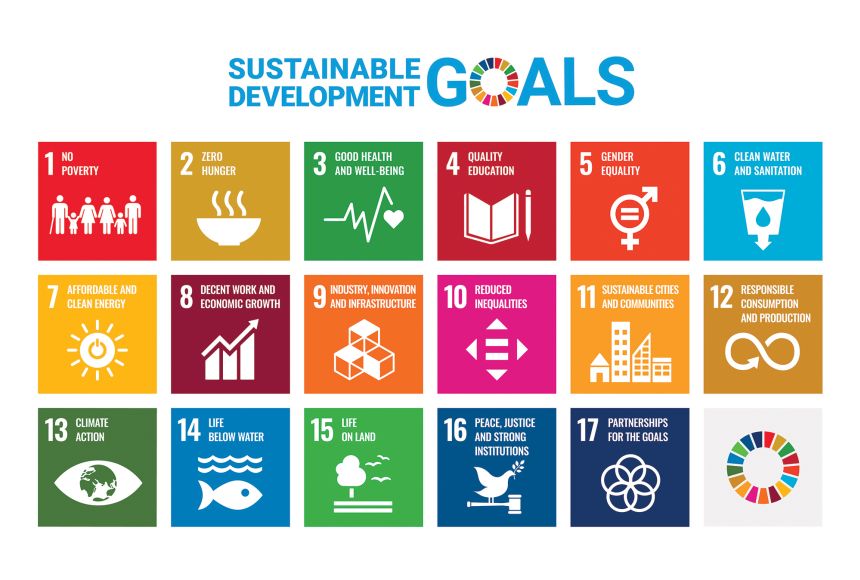
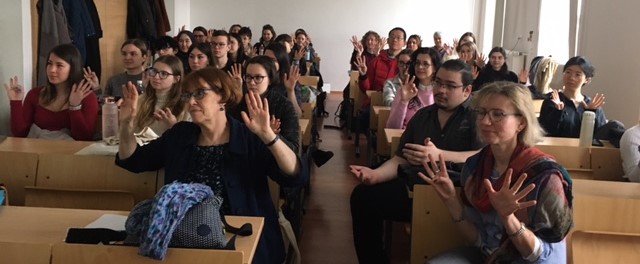
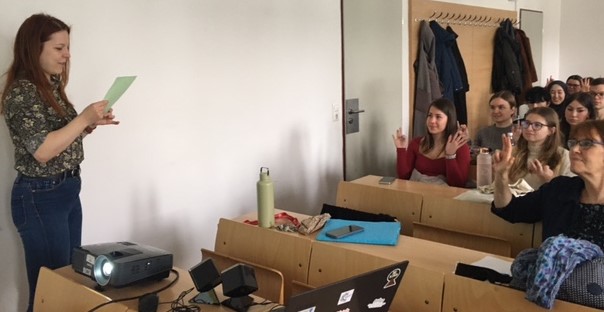

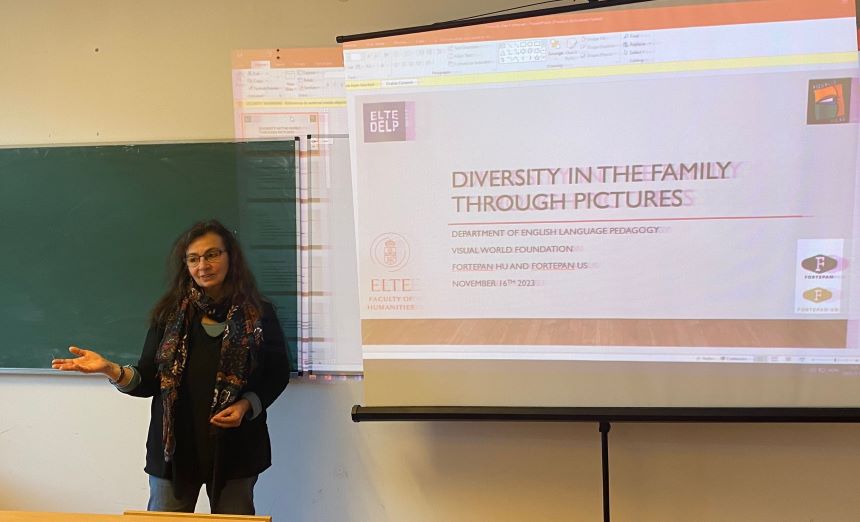
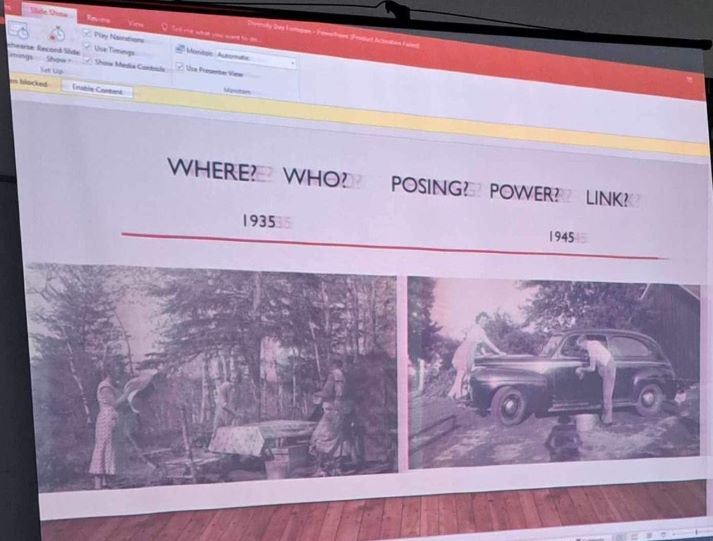
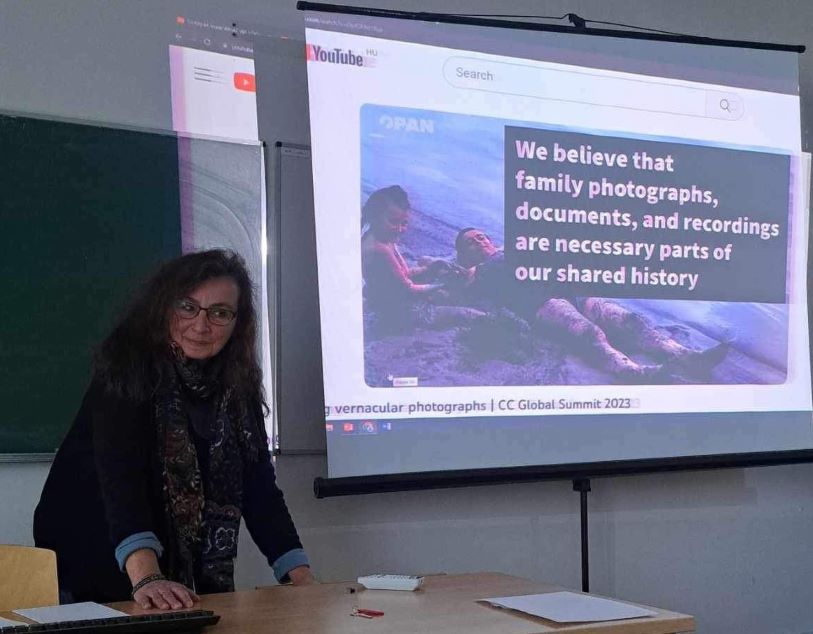
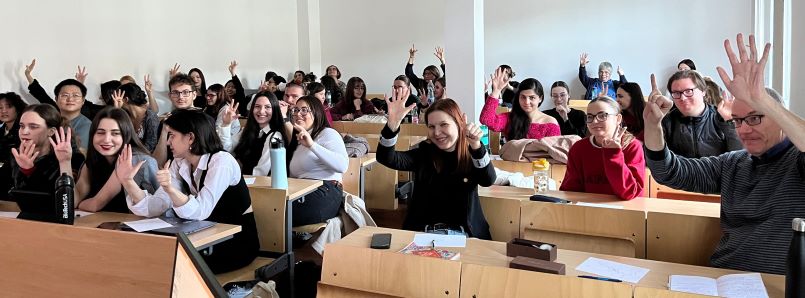
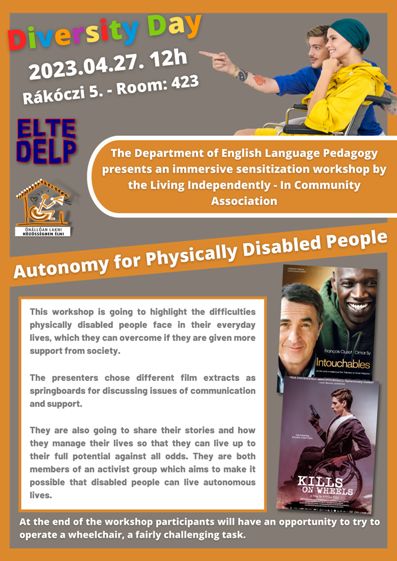
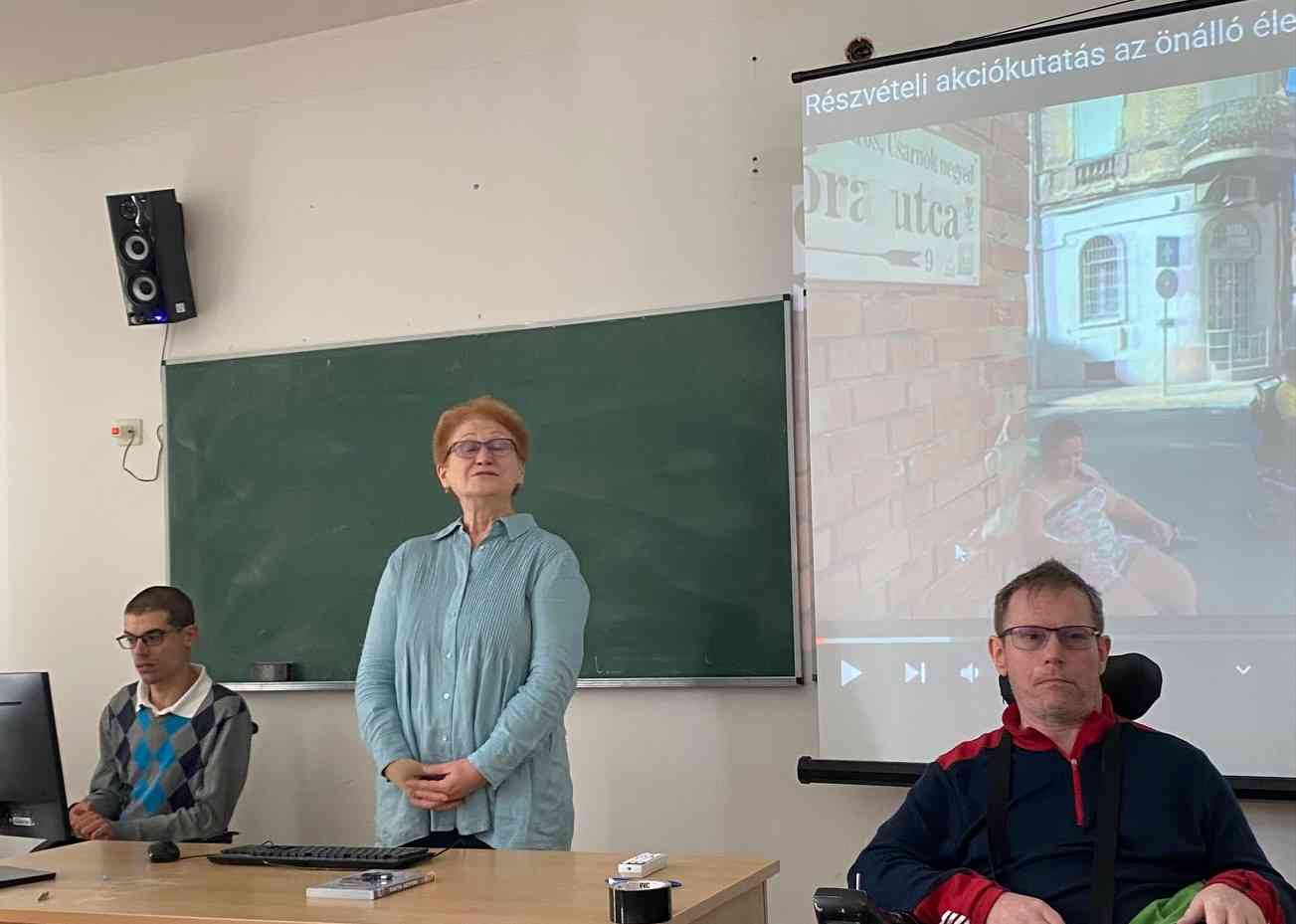
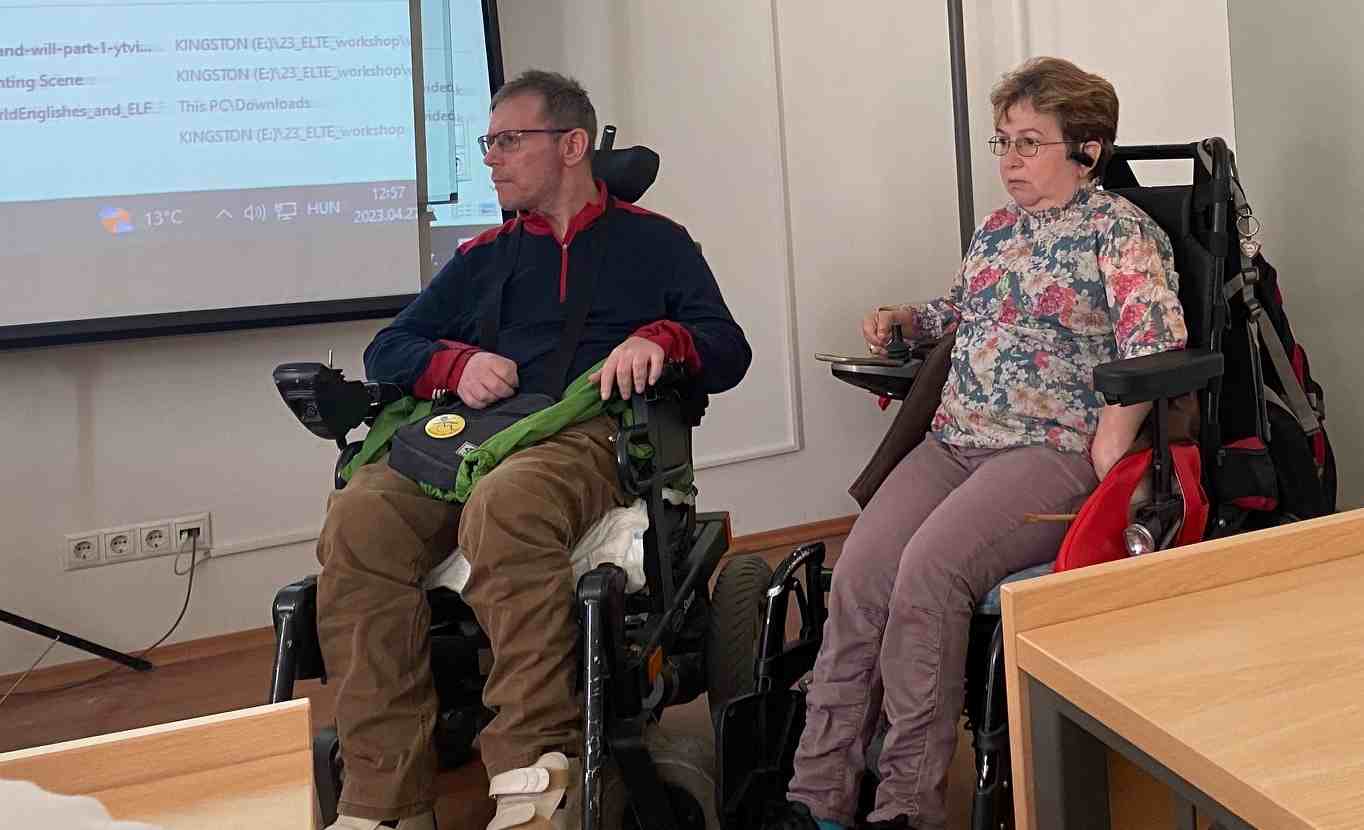


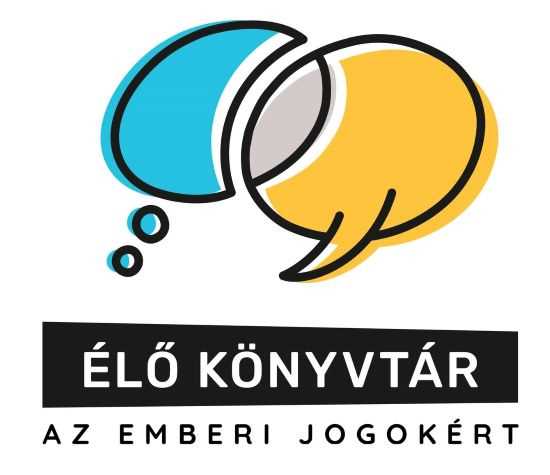
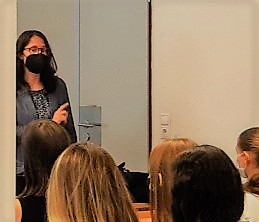
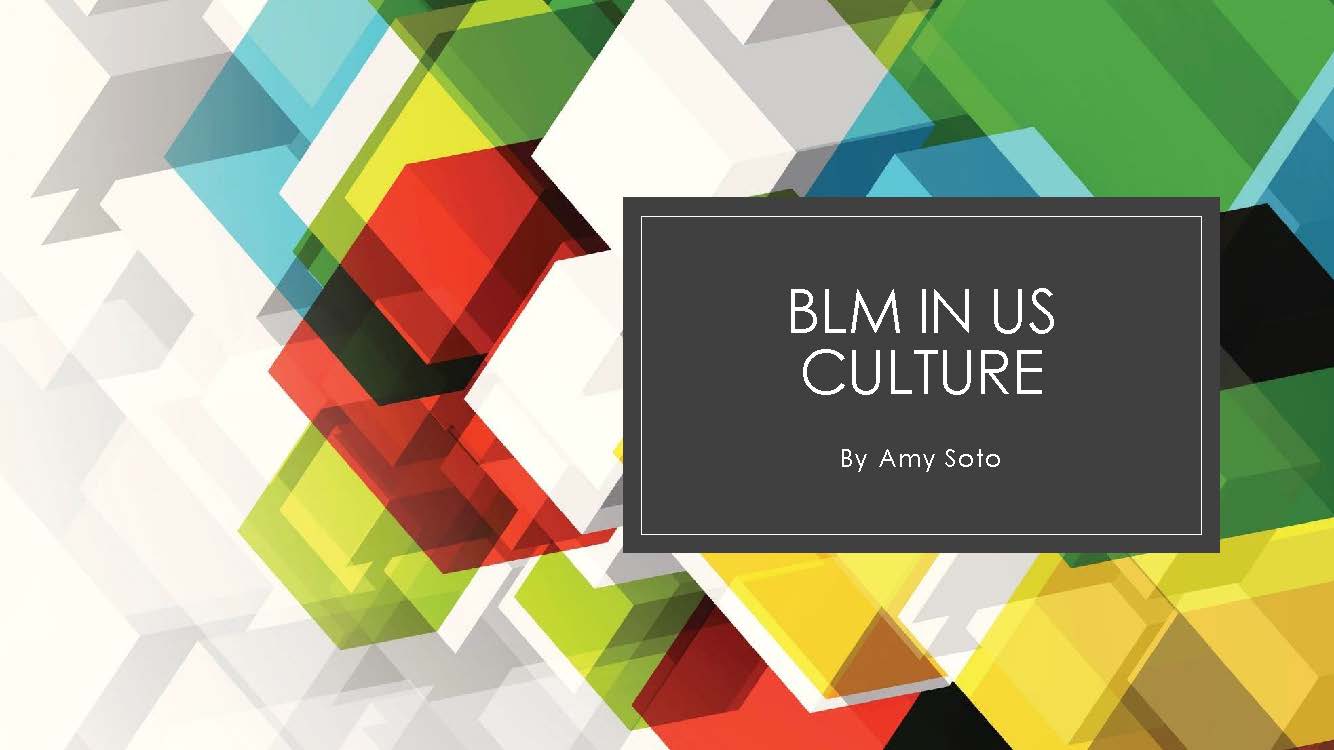
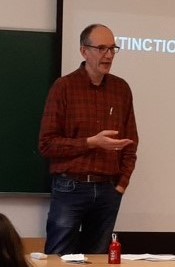
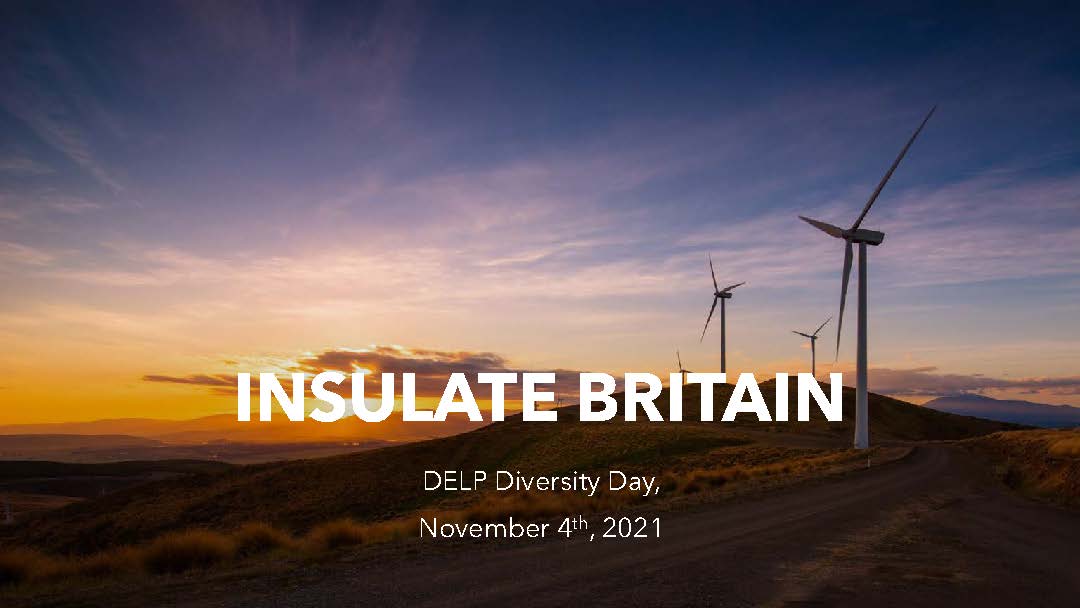

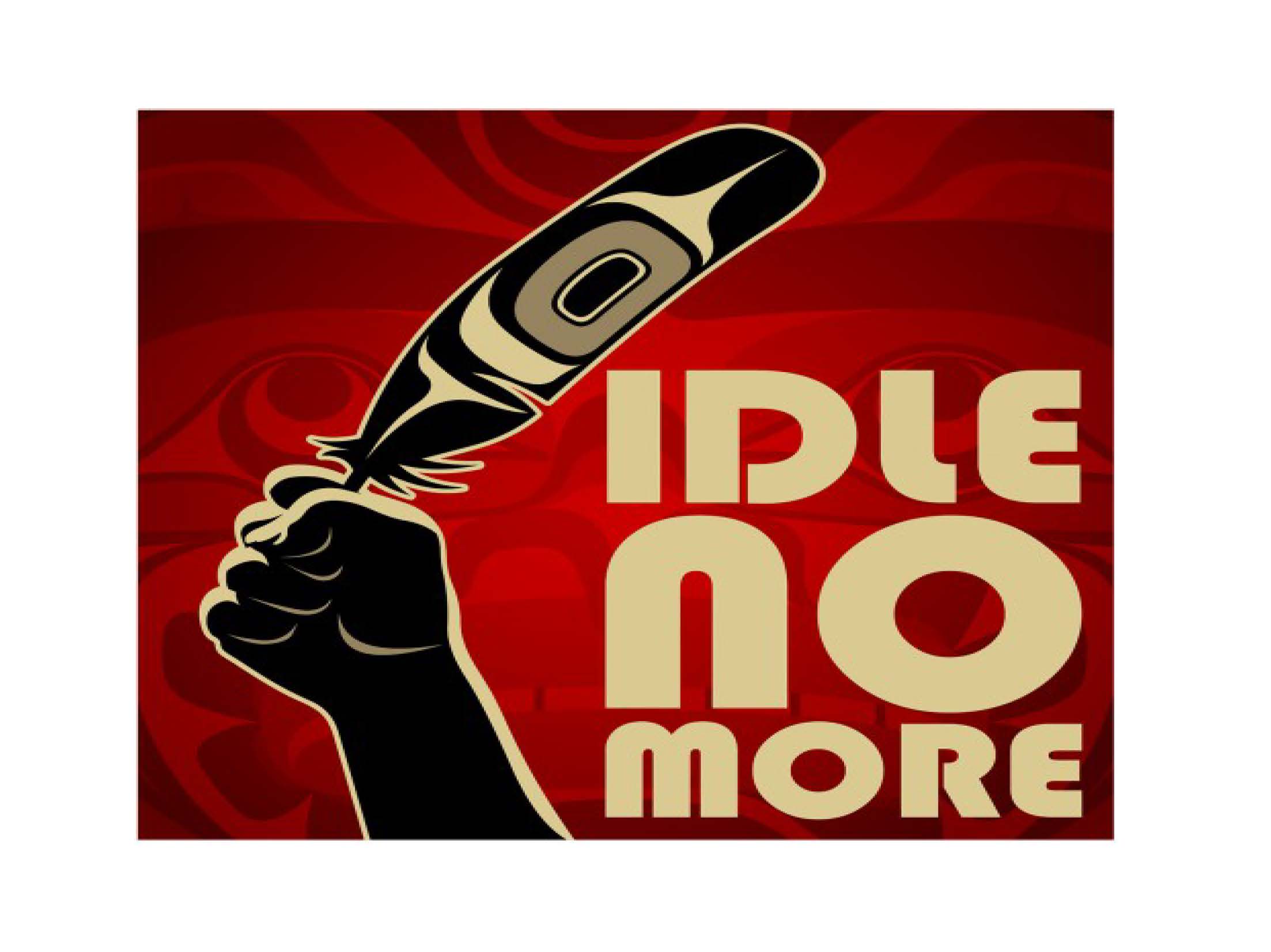
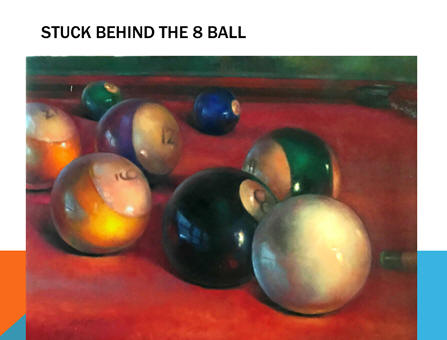

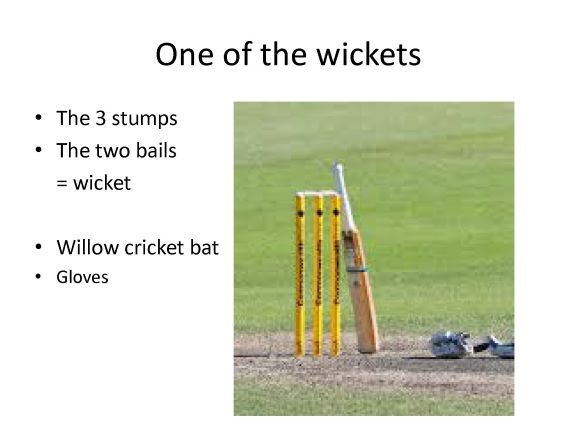
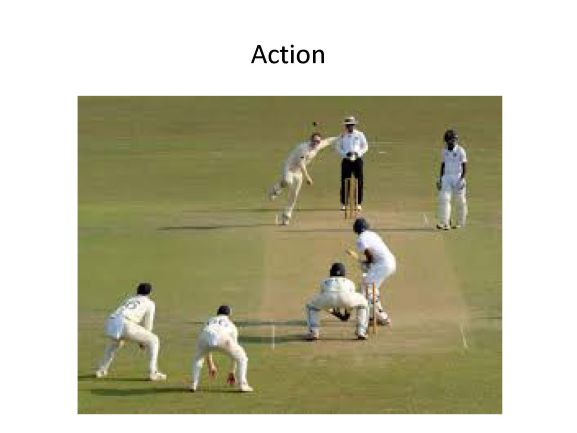
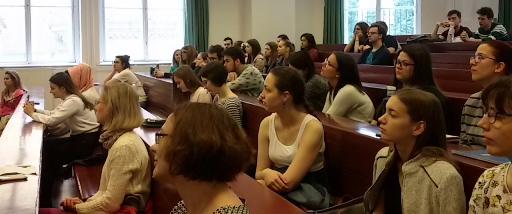
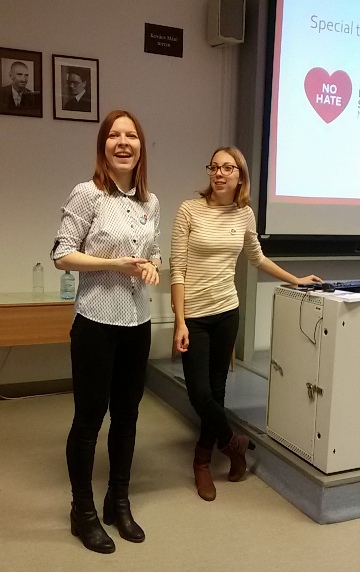
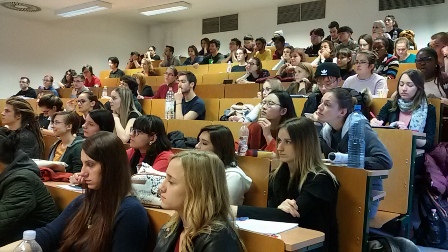
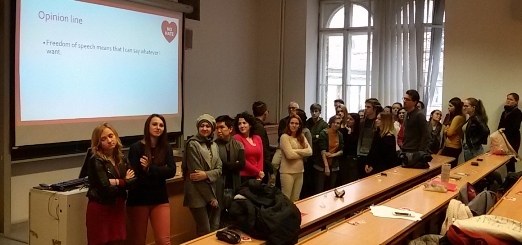
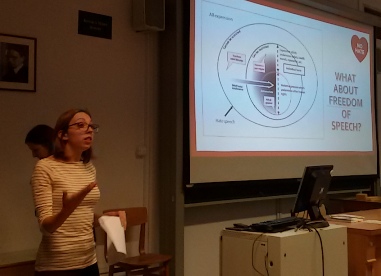
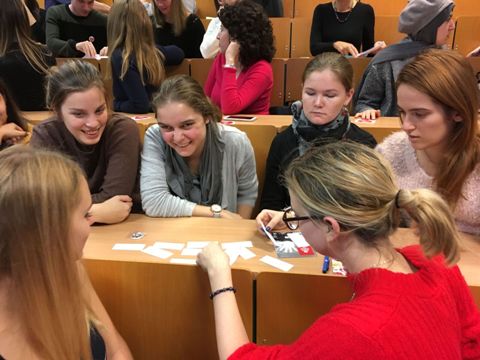
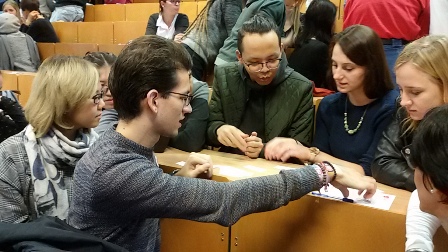
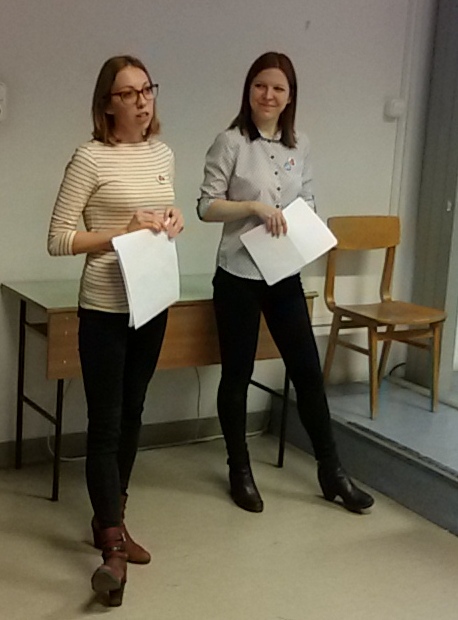
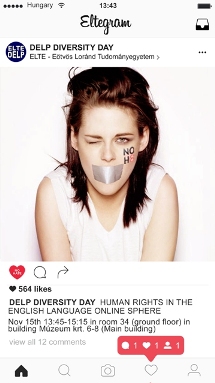
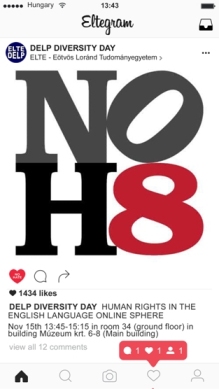
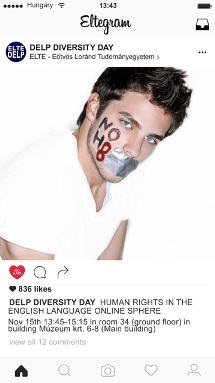
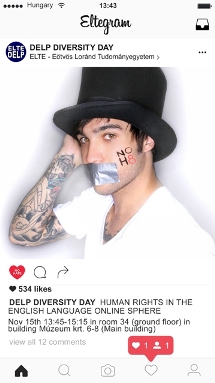
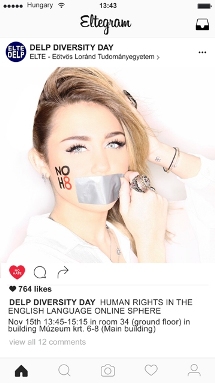

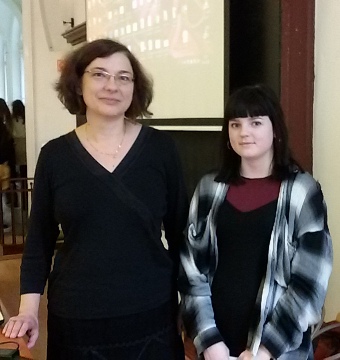
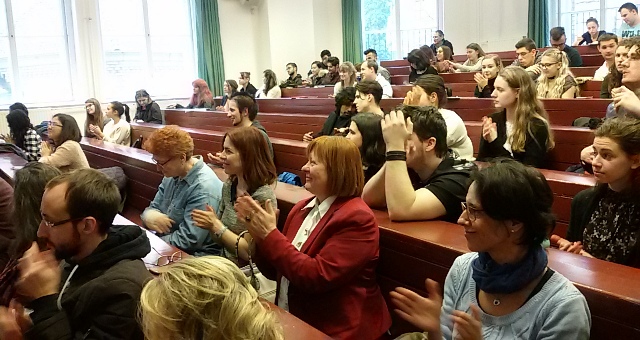
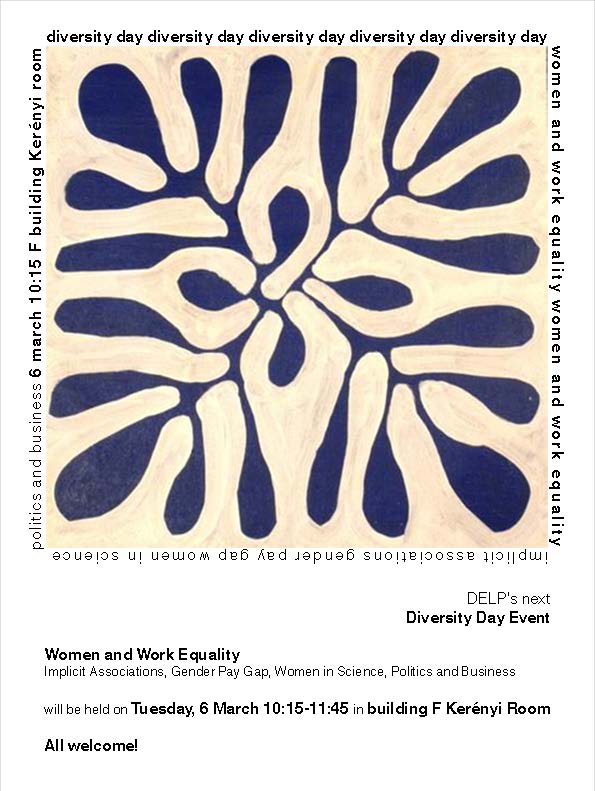
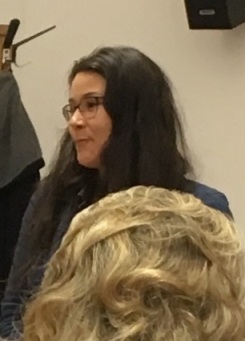
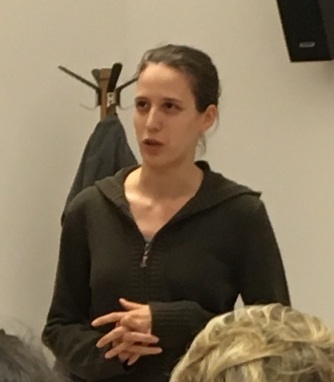
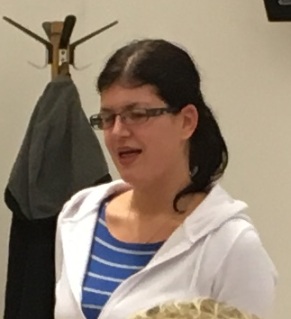
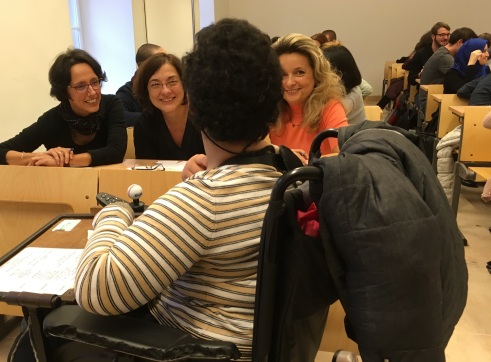
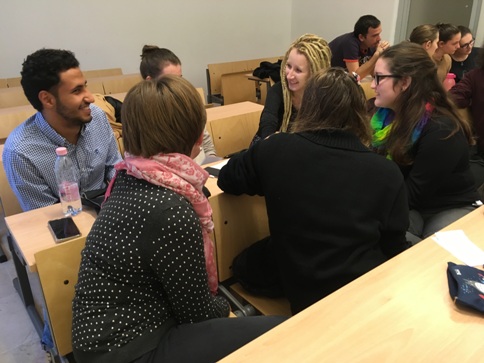
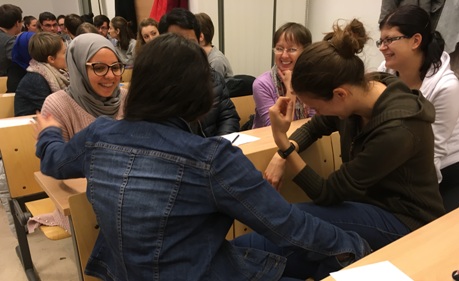
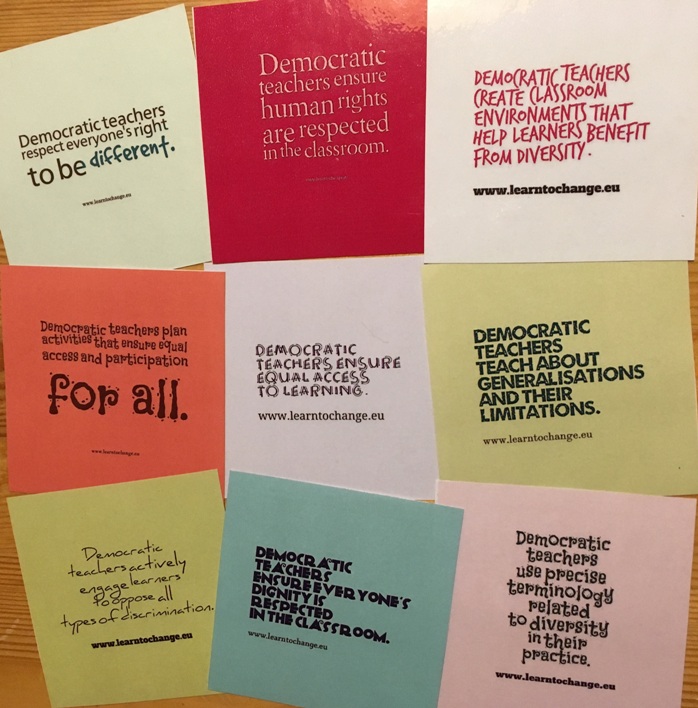
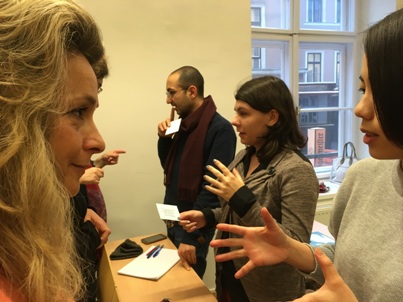
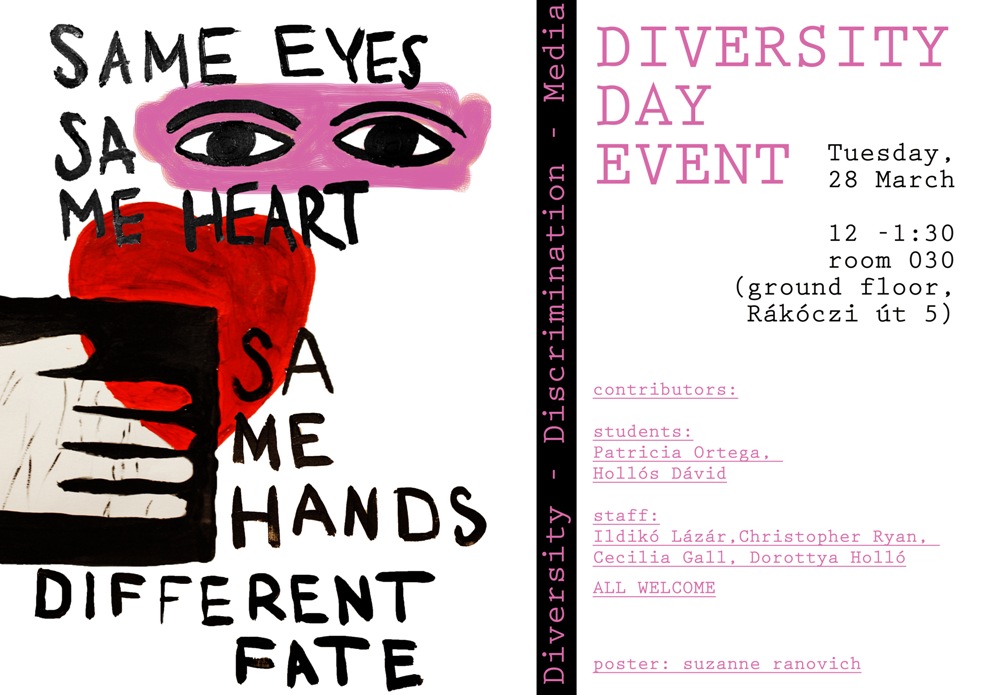
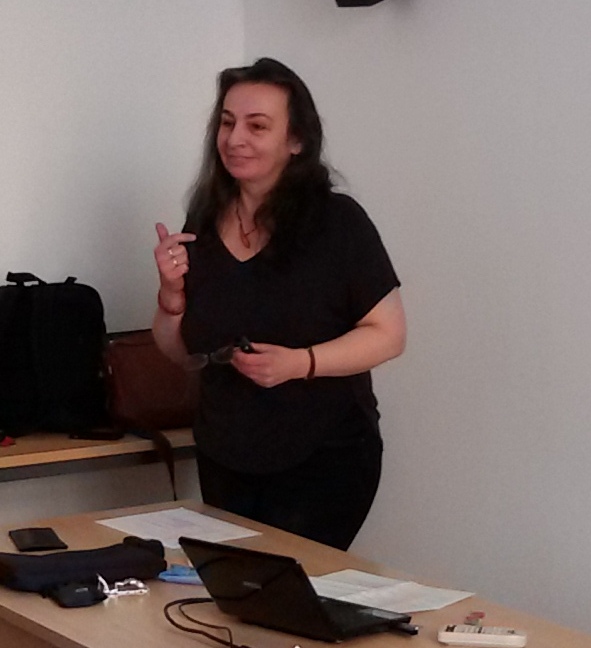
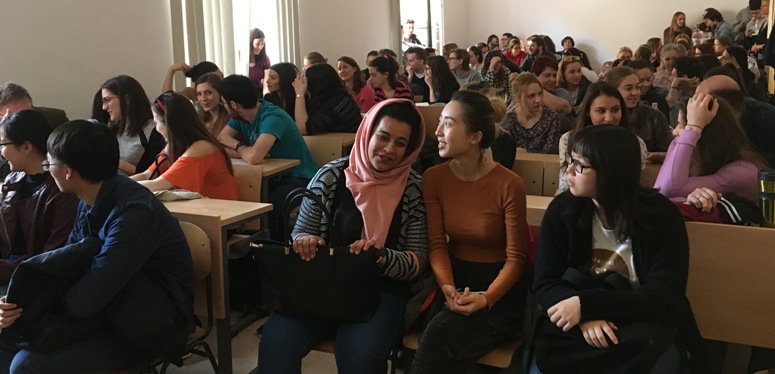
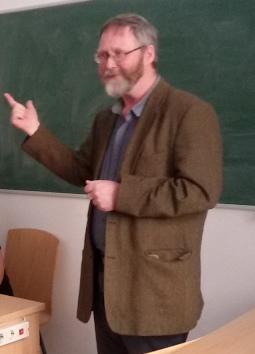
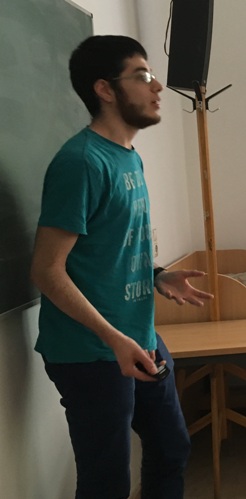
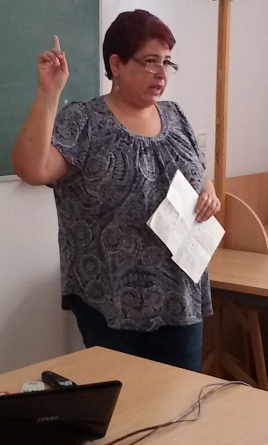
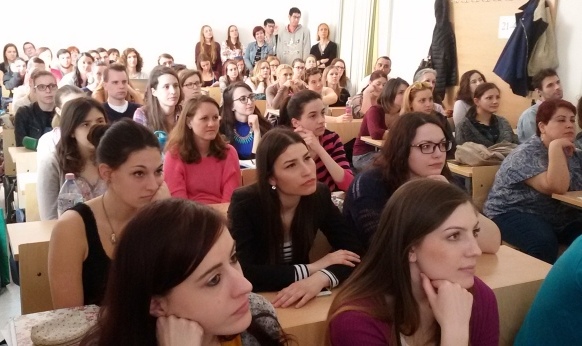
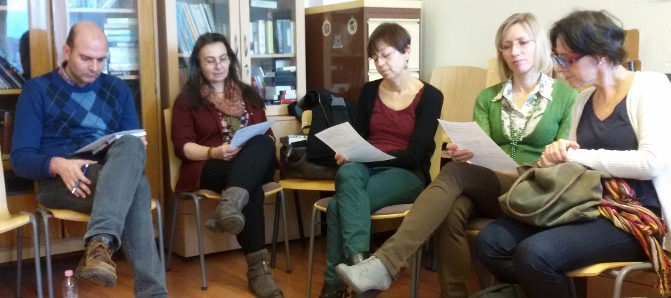
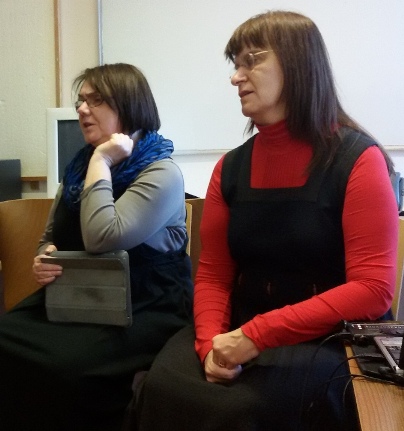
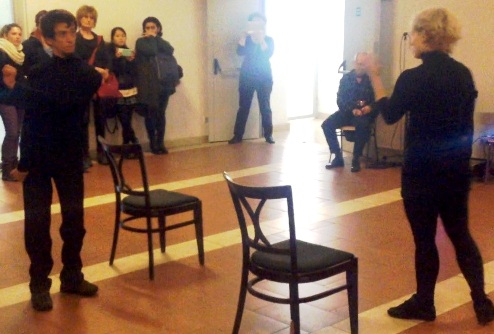
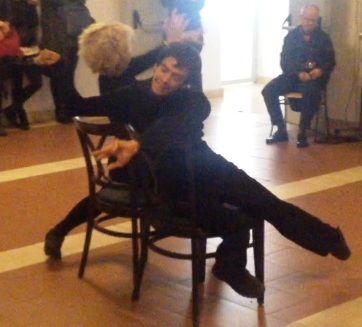

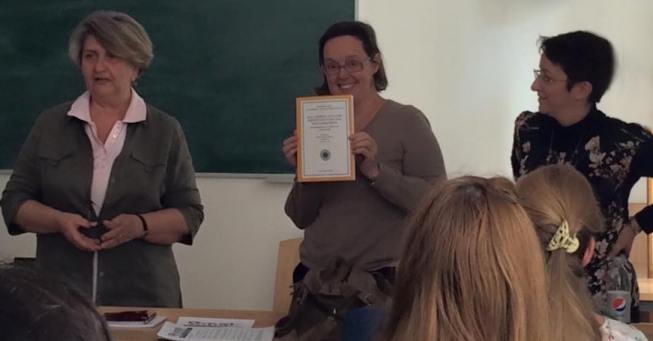
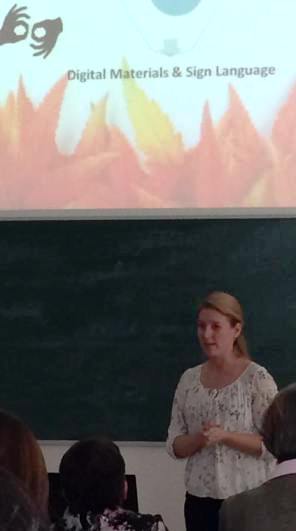
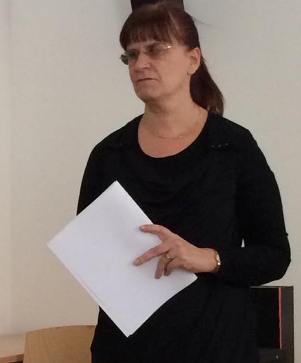
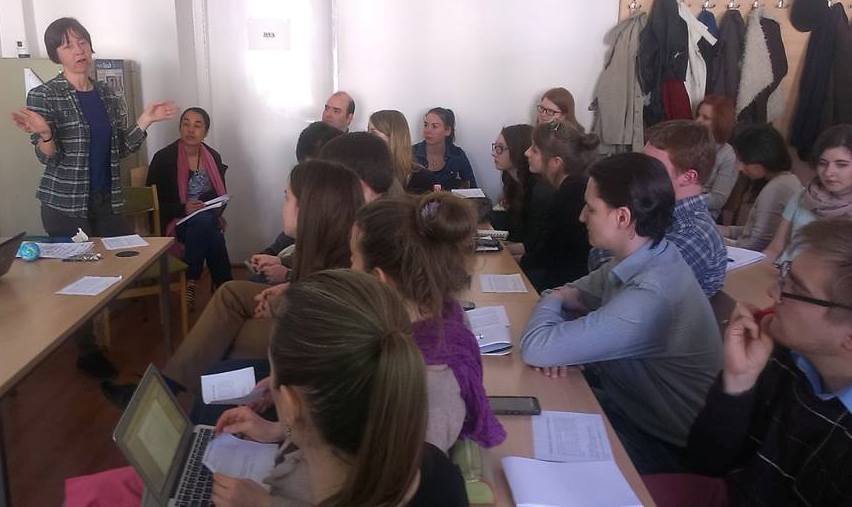

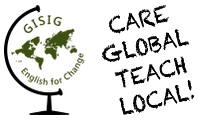
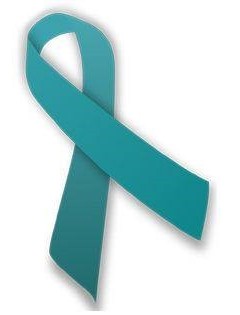
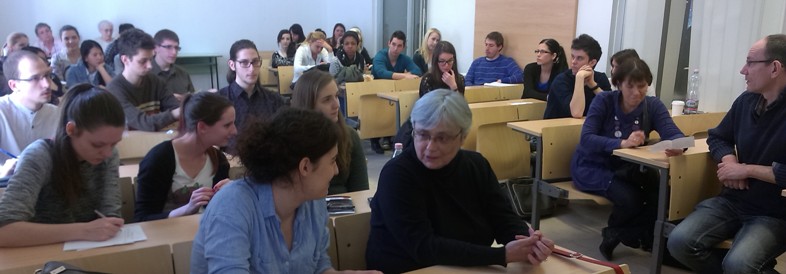

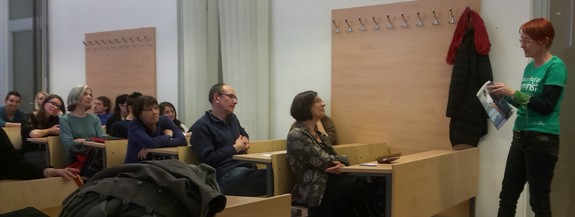
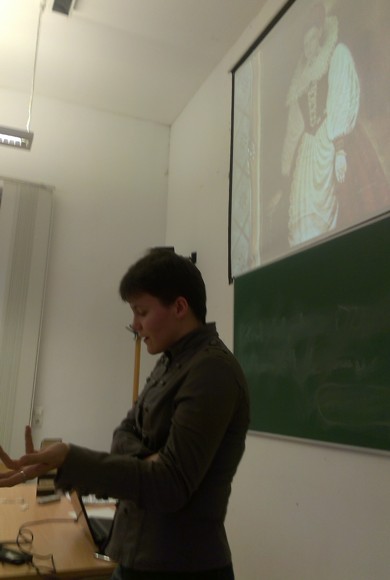

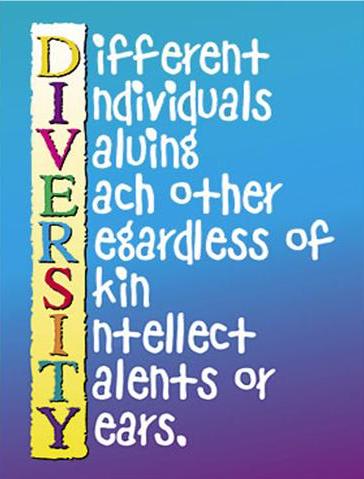
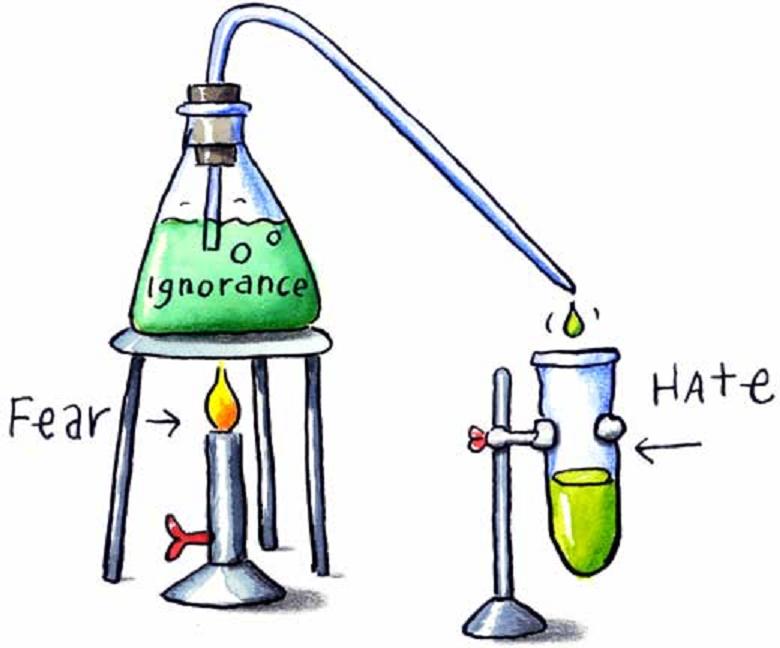

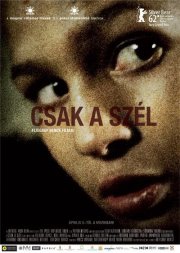
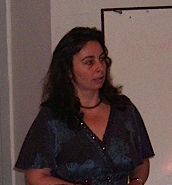
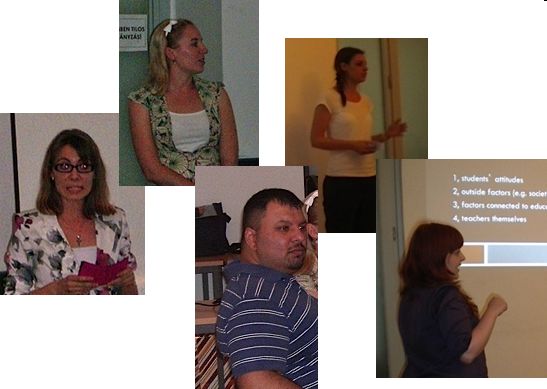
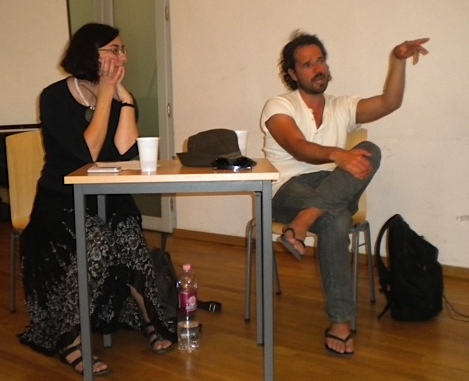
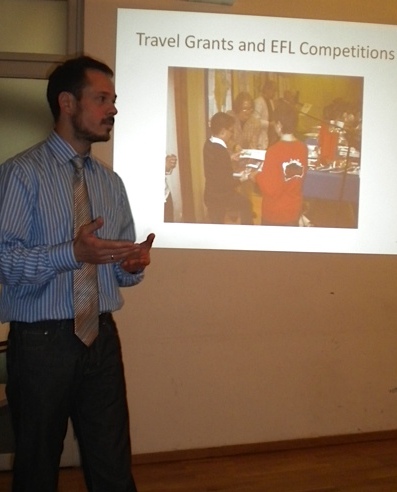
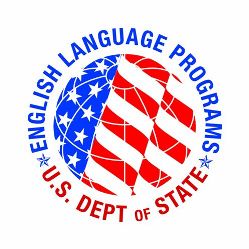
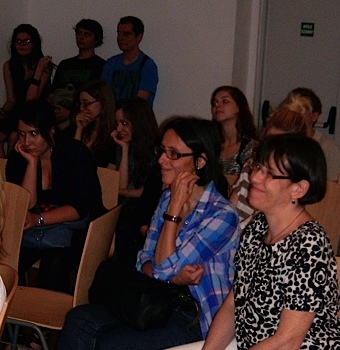
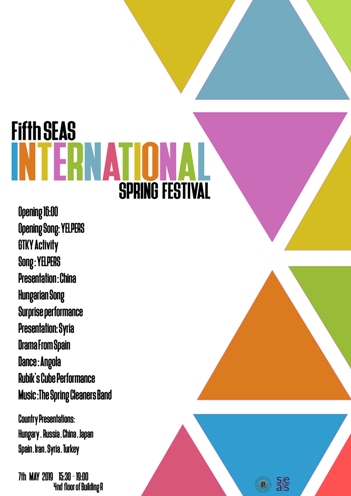

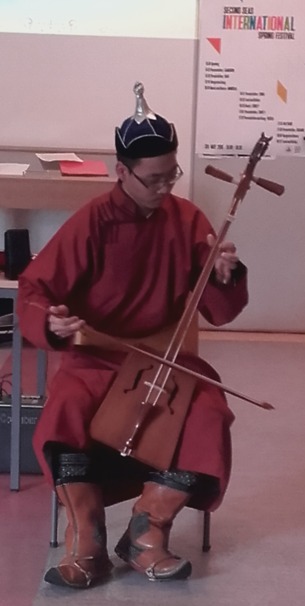

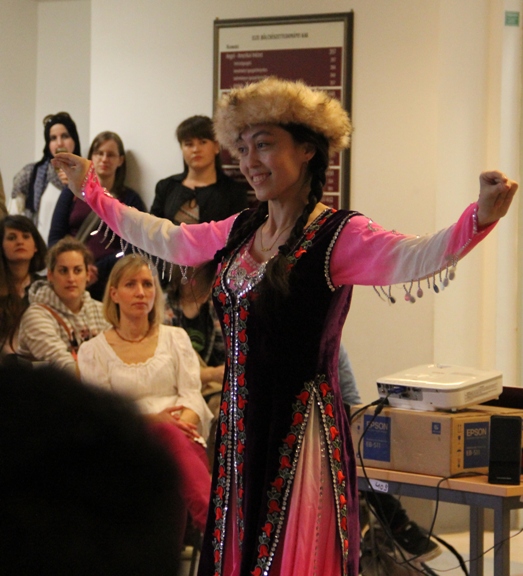

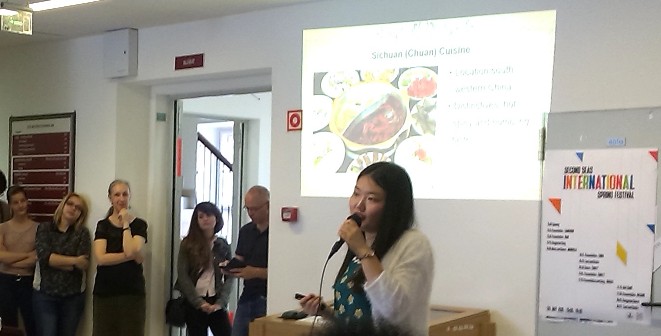
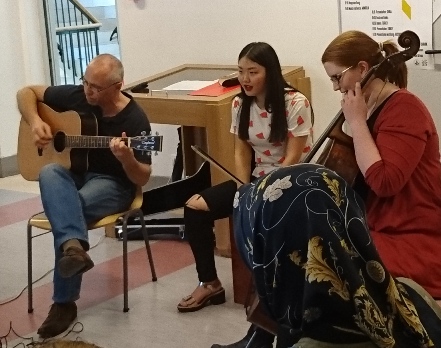

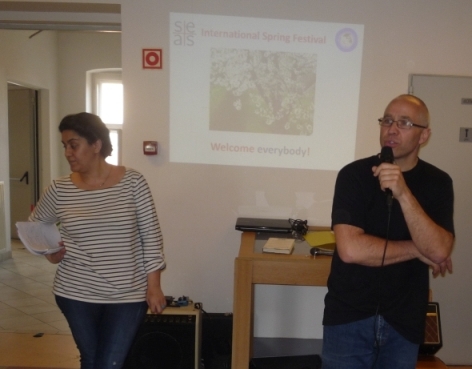
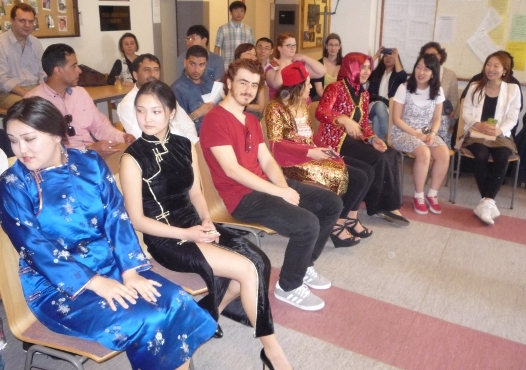
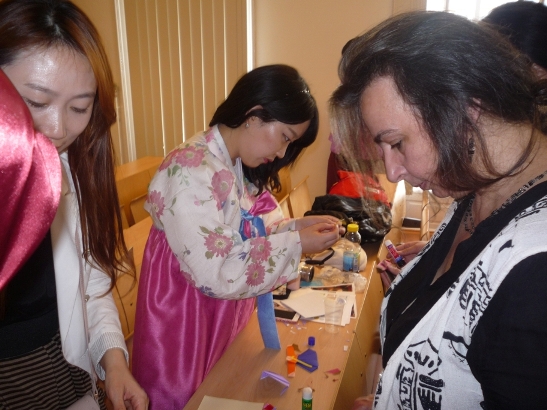
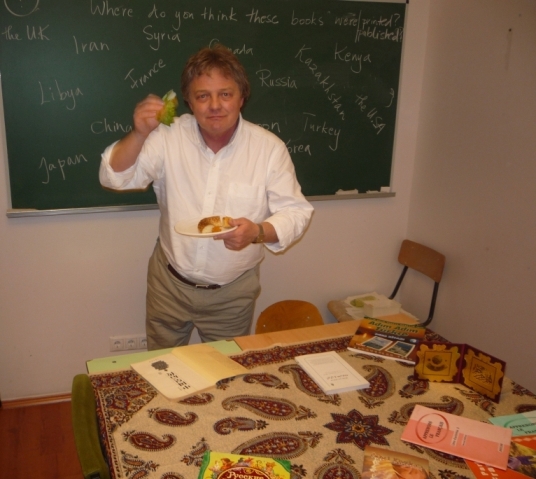
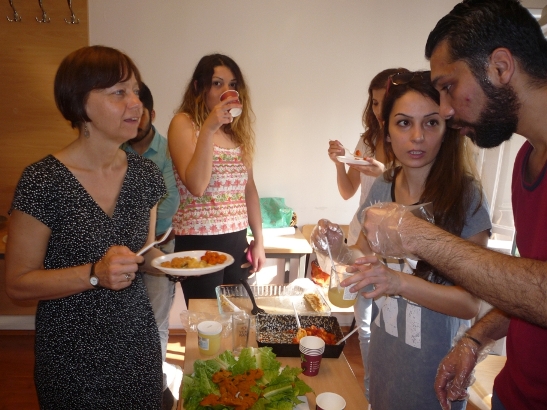
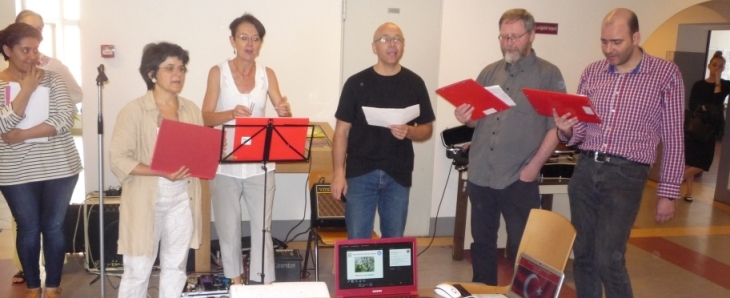
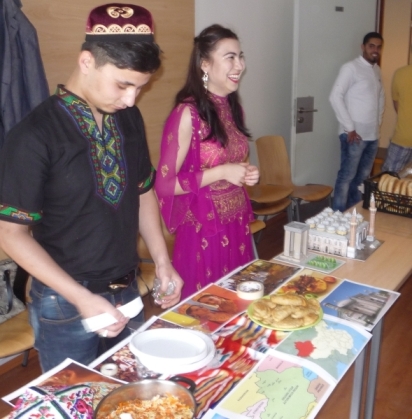
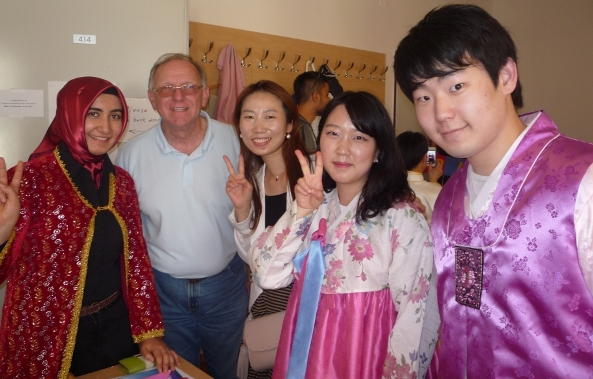
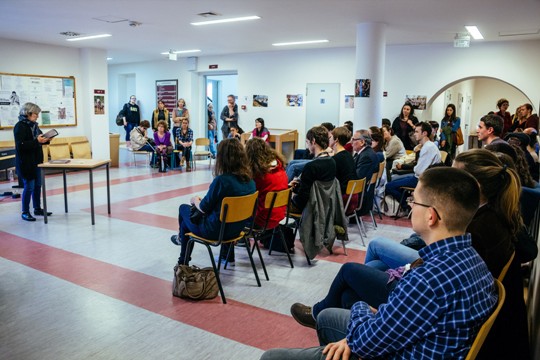 Janet
Holmes reading her poetry & the audience
Janet
Holmes reading her poetry & the audience Jiving
along
Jiving
along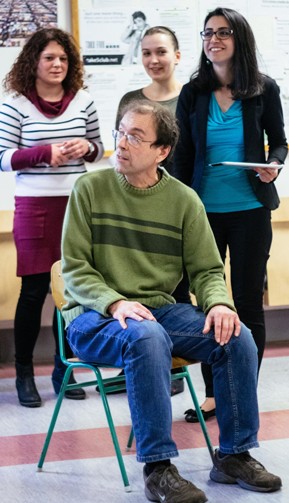 Irish in
the US quiz by James Leavey and his students
Irish in
the US quiz by James Leavey and his students Jilly
Viktor on the Harlem Renaissance Movement
Jilly
Viktor on the Harlem Renaissance Movement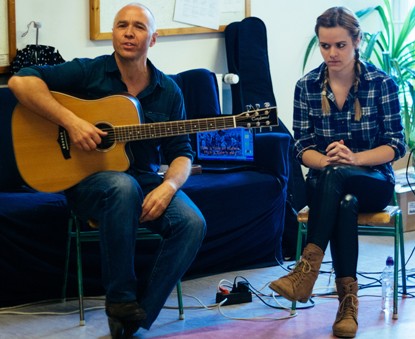 Langner
Livi and Uwe Pohl singing Country and Western
Langner
Livi and Uwe Pohl singing Country and Western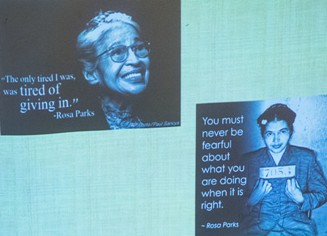 Rosa
Parks Quotes
Rosa
Parks Quotes